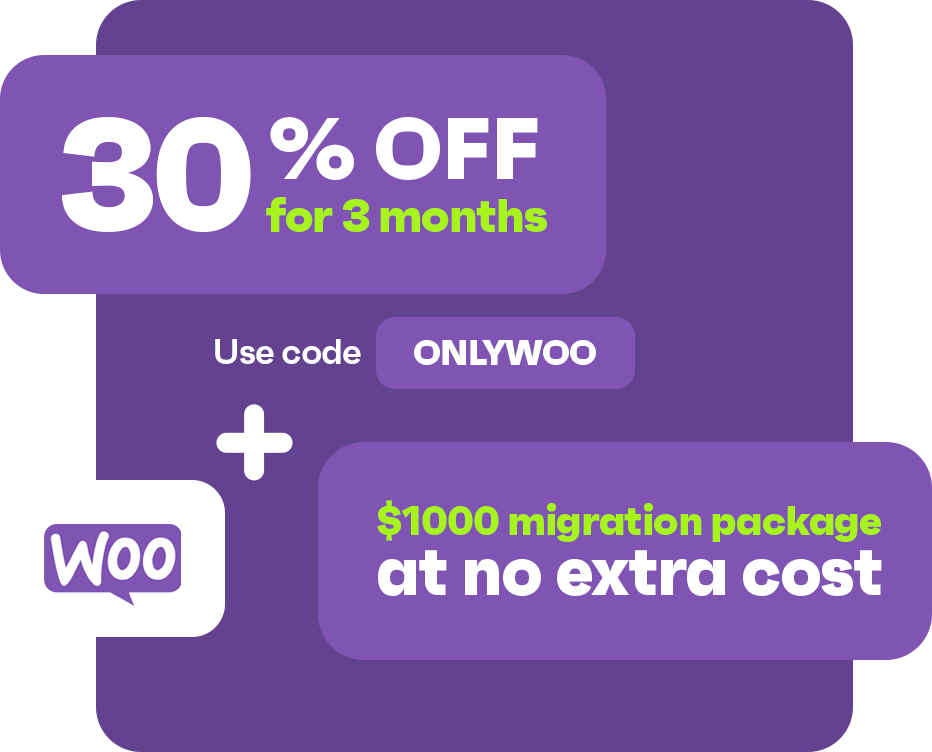Drive sales on autopilot with ecommerce-focused features
See FeaturesWooCommerce dropshipping: Complete guide + 11 best plugins
Read summarized version with
WooCommerce dropshipping plugins connect your store to supplier inventories so you don’t have to keep physical inventories, rent warehouse space, or pack boxes.
When a customer orders, the plugin forwards their details to your supplier, who ships directly to the buyer. You handle marketing and customer service while suppliers manage everything else.
We tested 11 WooCommerce dropshipping plugins to find which ones deliver on their promises. In this detailed guide, we’ll show you how to set up a dropshipping store in WooCommerce, choose the right dropship plugins for WooCommerce, vet suppliers, and automate marketing.
Key takeaways:
- WooCommerce dropshipping eliminates the need for inventory and warehouse costs
- Your WooCommerce dropshipping plugin directly impacts automation quality and profit margins
- Omnisend email and SMS automation captures abandoned carts and turns first-time buyers into repeat customers
Quick sign up | No credit card required
What is WooCommerce dropshipping?
WooCommerce dropshipping is a business model where you sell products on your WordPress store without holding inventory.
You list products from suppliers on your site, and when someone buys, the supplier ships directly to your customer. Your profit comes from the difference between what customers pay and what WooCommerce dropship suppliers charge.
How dropshipping works
There are six basic steps to WooCommerce dropshipping:
- Find reliable suppliers — Research and connect with dropshipping suppliers who offer products you want to sell
- Sync your store — Import product listings, prices, and inventory data from suppliers into your WooCommerce store using dropshipping plugins
- Customer places order — Someone buys a product from your store using your payment gateway, paying you directly
- You forward the details — Send the order information and customer shipping address to your supplier for fulfillment
- Supplier ships directly — The supplier packages and ships the product straight to your customer
- Post-purchase communication — You are in charge of the customer relationship after purchase
The image below shows how dropshipping works with additional detail:
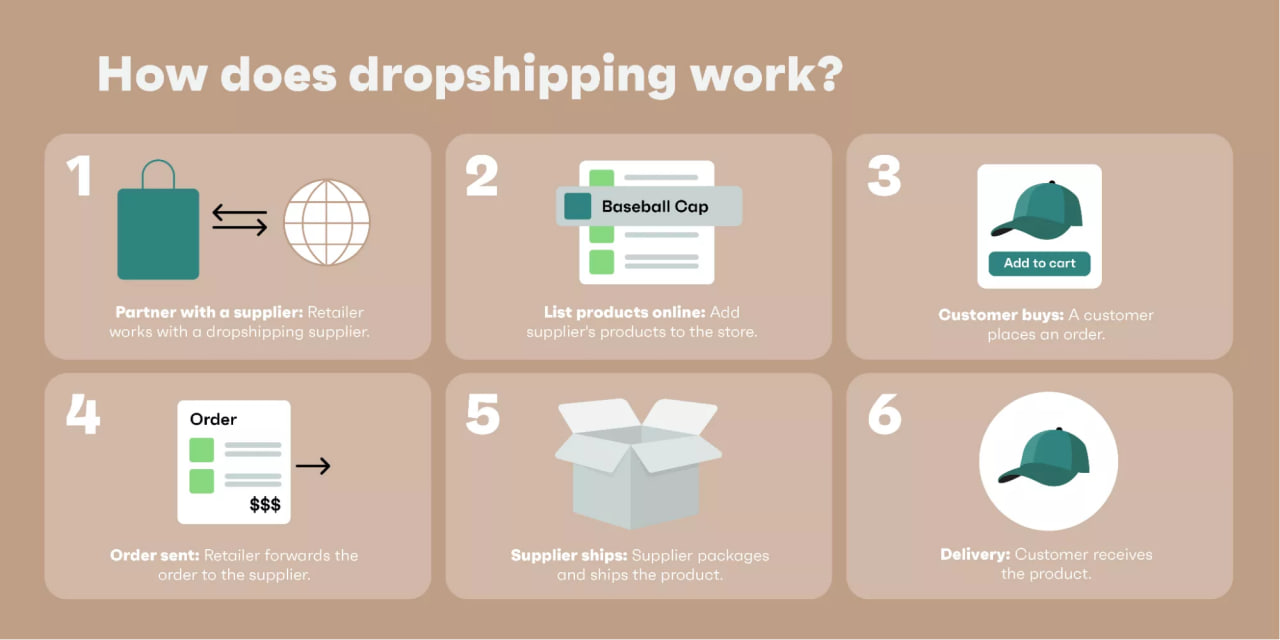
Key advantages
- Start with almost nothing — Launch a store without buying products first or renting warehouse space
- Test what sells — Try different products without upfront investment to see what customers want
- Work from anywhere — Manage your business remotely without physical location requirements
- No leftover inventory — Avoid getting stuck with products that don’t sell
Potential challenges
- Small profit margins — Competition keeps prices low, and supplier costs eat into earnings
- Supplier problems become your problems — Late shipments and quality issues reflect on your business
- Shipping complications — Multiple suppliers mean inconsistent delivery times and customer confusion
- Hard to stand out — Many stores sell identical products and use similar themes, making differentiation difficult
Compare the best WooCommerce dropshipping plugins
Compare the best dropshipping plugins for WooCommerce store:
| WooCommerce dropshipping plugin | At a glance | Best for | Pricing | Free plan | Automation level | Supplier regions | Key feature | Ease of use | Features | Value | Support |
|---|---|---|---|---|---|---|---|---|---|---|---|
| AliDropship | One-time fee, lifetime access to AliExpress automation | Long-term AliExpress sellers wanting to own tools outright | $89 one-time | ❌ | High | China (AliExpress) | Eight percent cashback on orders | ⭐⭐⭐⭐ | ⭐⭐⭐⭐ | ⭐⭐⭐⭐⭐ | ⭐⭐⭐ |
| WooCommerce Dropshipping | Official WooCommerce extension | WooCommerce users wanting official integration and support | $79/year | ❌ | Medium | Global network | Native WooCommerce integration | ⭐⭐⭐⭐⭐ | ⭐⭐⭐ | ⭐⭐⭐⭐ | ⭐⭐⭐⭐⭐ |
| DropshipMe | Pre-built store with curated products and edited descriptions | Beginners wanting a store without technical work | Free, paid from $29 | ✅ | Medium | China (AliExpress) | Turnkey store setup | ⭐⭐⭐⭐⭐ | ⭐⭐⭐ | ⭐⭐⭐⭐ | ⭐⭐⭐⭐ |
| WooDropship | DIY plugin or done-for-you store in 12 hours | Beginners on a budget wanting flexibility | $49 for a prebuilt store, $89 for plugin license | ❌ | Medium | China (AliExpress) | Dual setup options | ⭐⭐⭐⭐ | ⭐⭐⭐ | ⭐⭐⭐⭐⭐ | ⭐⭐⭐ |
| Zendrop | Dropshipping, POD, and 3PL in one platform | Scaling businesses wanting multiple fulfillment options | Free, paid from $49/month | ✅ | High | US, China | Multi-channel fulfillment | ⭐⭐⭐⭐ | ⭐⭐⭐⭐⭐ | ⭐⭐⭐ | ⭐⭐⭐⭐ |
| Spocket | Fast 2–5 day shipping from Western suppliers | Stores targeting customers who expect fast delivery | From $39.99/month | ❌ | High | US, Europe, Australia | Supplier messaging | ⭐⭐⭐⭐ | ⭐⭐⭐⭐ | ⭐⭐⭐ | ⭐⭐⭐⭐ |
| Syncee | 12,000+ independent brands with unique products | Sellers wanting unique products from smaller brands | Free, paid from $39.99/month | ✅ | High | Global network | Dropship + wholesale | ⭐⭐⭐⭐ | ⭐⭐⭐⭐ | ⭐⭐⭐⭐ | ⭐⭐⭐⭐ |
| Sharkdropship | Dropshipping or affiliate marketing in one plugin | Occasional sellers wanting both business models | Free, paid plans from $23.59/year | ✅ | Low | Unspecified | Dual dropship/affiliate | ⭐⭐⭐ | ⭐⭐⭐ | ⭐⭐⭐⭐⭐ | ⭐⭐⭐ |
| Dropified | Multi-supplier automation across platforms | Multi-store managers needing advanced automation | Paid plans from $50/month | ❌ | Very high | US, Europe, China | Multi-vendor mapping | ⭐⭐⭐ | ⭐⭐⭐⭐⭐ | ⭐⭐⭐ | ⭐⭐⭐⭐ |
| ALD | Granular pricing control for thousands of products | Advanced users wanting detailed AliExpress control | Free, paid from $32 one-time | ✅ | Medium | China (AliExpress) | Advanced pricing rules | ⭐⭐⭐ | ⭐⭐⭐⭐ | ⭐⭐⭐⭐⭐ | ⭐⭐⭐ |
| Importify | AI-powered content optimization for 25+ marketplaces | Multi-marketplace sellers wanting AI content tools | From $14.95/month | ❌ | Medium | Global network | GPT-4.1 content optimizer | ⭐⭐⭐⭐ | ⭐⭐⭐⭐⭐ | ⭐⭐⭐ | ⭐⭐⭐ |
WooCommerce vs. Shopify – which is better for dropshipping?
Both platforms work well for dropshipping, but they serve different needs. WooCommerce gives you complete control over your store and lowers long-term costs. Meanwhile, Shopify offers faster setup and handles technical maintenance.
Here’s how their dropshipping features compare:
| Feature | WooCommerce | Shopify |
|---|---|---|
| Setup costs | $1,000+/year | $500–$1,300+/year |
| Monthly fees | $20+ (hosting only) | $32–$2,300 + transaction fees |
| Transaction fees | Payment gateway fees only (2.9% + $0.30) | 0.2–2% extra unless using Shopify Payments |
| Customization | Full control via WordPress themes and code | Limited to theme options and apps |
| Plugin options | 1,199 | 700+ |
| Technical knowledge | Moderate (WordPress familiarity is helpful) | Minimal (hosted solution) |
| Ownership | You own everything | Shopify owns the platform |
| Scalability | Unlimited with proper hosting | Built-in scaling infrastructure |
Cost comparison
WooCommerce has lower upfront costs but requires separate hosting. You’ll pay $20+/month for hosting, depending on your traffic. Domain registration costs $15+/year. Most WooCommerce dropshipping plugins offer free plans or one-time fees.
Meanwhile, Shopify charges $32/month for the Basic plan, which includes hosting. However, you’ll pay 2% transaction fees on every sale if you don’t use Shopify Payments.
Shopify’s transaction fees are much lower on the more advanced plans:
- Grow ($92/month): 1%
- Advanced ($399+/month): 0.6%
- Plus ($2,300+/month): 0.2%
Total first-year costs for WooCommerce typically go over $1,000. Likewise, Shopify costs $500–1,300+/year for the Basic plan, plus transaction fees.
The cost difference also grows as your sales increase. WooCommerce hosting scales affordably, while Shopify’s percentage-based fees take bigger bites from revenue.
Customization and control
WooCommerce runs on WordPress. This gives you access to thousands of themes and WordPress WooCommerce dropshipping plugins. You can modify any code, change any design element, and integrate with any service.
Shopify, however, limits customization to what themes and apps allow. You can’t access the core code without its Liquid programming language.
That said, here’s how both tools’ analytics dashboards look:
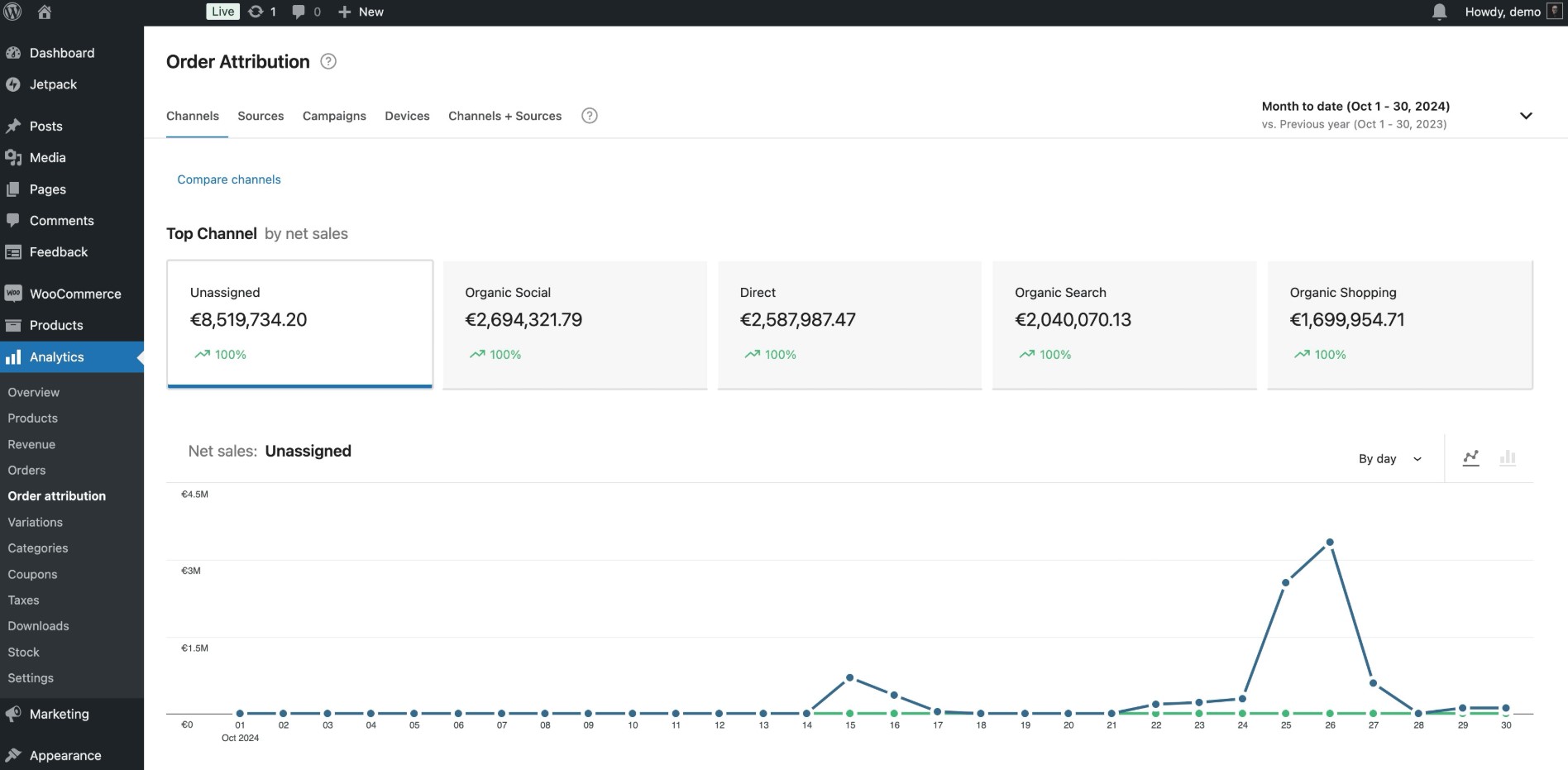
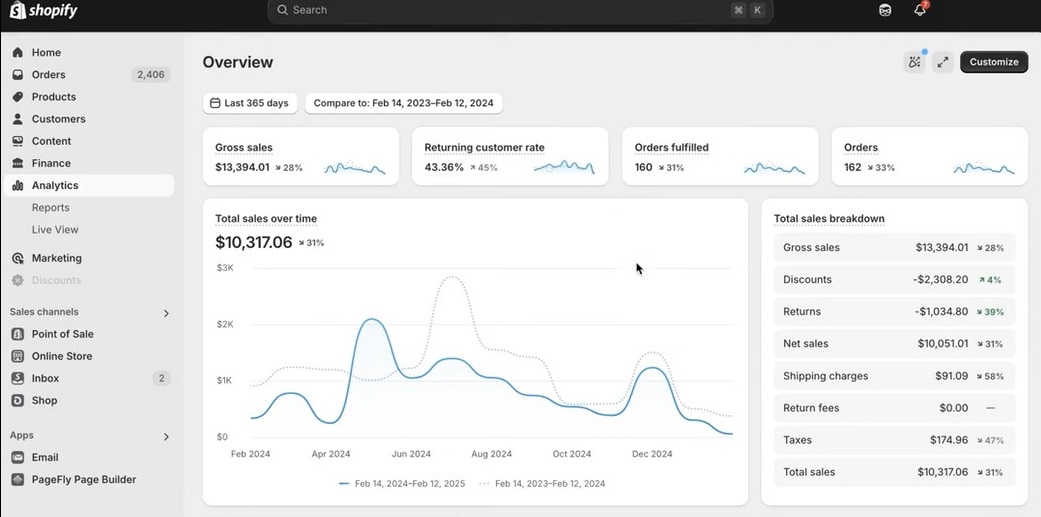
Which should you choose?
Choose WooCommerce if:
- You want full control over your store’s design and functionality
- You’re comfortable with WordPress or are willing to learn
- You plan to scale beyond basic dropshipping features
Choose Shopify if:
- You want to launch fast without a technical setup
- You prefer monthly fees over managing hosting
- You need reliable support for technical issues
How to set up a dropshipping store with WooCommerce
Follow these steps to build your dropshipping store with WooCommerce properly from the start:
Quick start checklist:
□ Choose a hosting provider (15 minutes)
□ Install WordPress (five minutes)
□ Install WooCommerce (10 minutes)
□ Select and activate a theme (20 minutes)
□ Connect your WooCommerce dropshipping plugin (30 minutes)
Total time: 90 minutes
Step 1 — Choose reliable hosting
Dropshipping stores need hosting that can handle traffic spikes and provide security. Look for:
- One-click WordPress installation
- SSL certificates included
- Daily automated backups
- 99.9% uptime guarantees
- WooCommerce infrastructure, such as free optimization plugins
Step 2 — Install WordPress
Most hosts offer one-click WordPress installation:
- Log in to your hosting control panel or cPanel
- Find the WordPress installer (often under Apps or One-click Install) — the example below shows the WordPress app listed under installation:
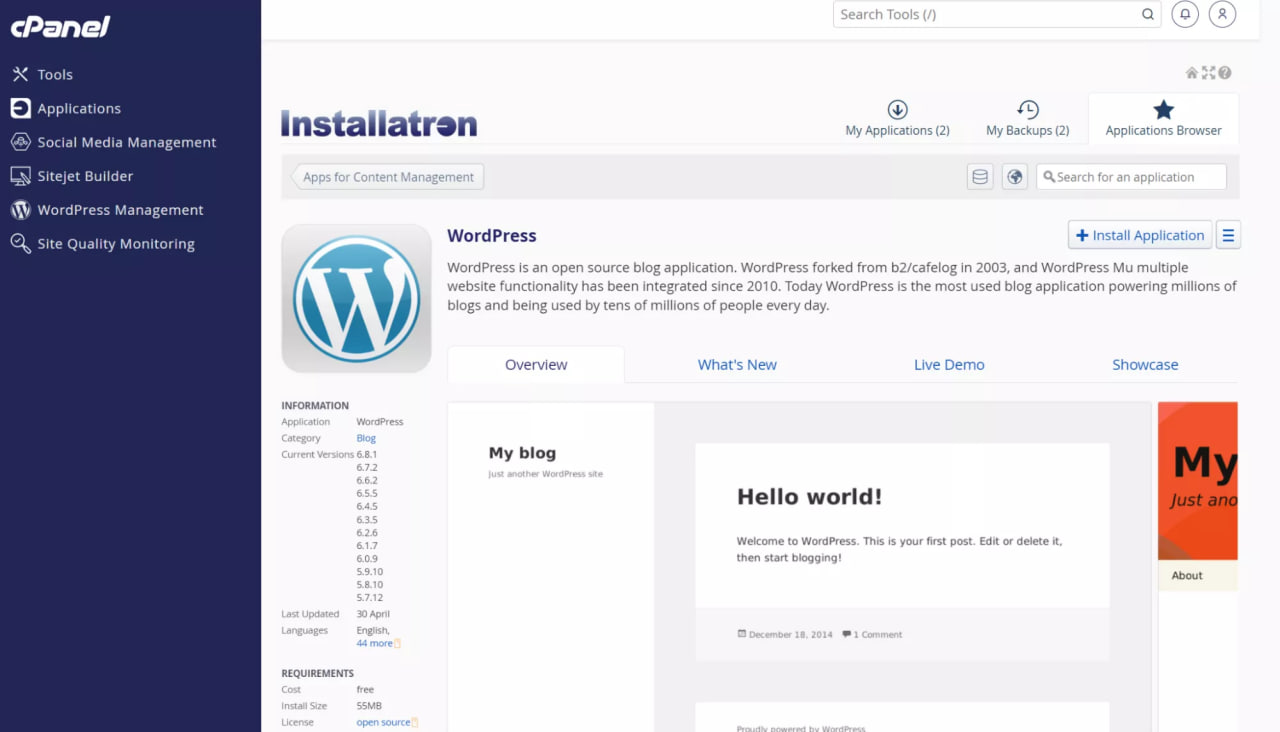
- Select your domain and directory
- Create your admin username and password
- Click Install and wait for completion
Manual installation (if needed):
- Download WordPress from wordpress.org
- Upload files via FTP to your hosting account
- Create a MySQL database through your hosting panel
- Navigate to your domain and run the Setup Wizard
- Enter database details and admin credentials
Step 3 — Install and configure WooCommerce
Add ecommerce functionality to WordPress:
- Log in to your WordPress admin dashboard
- Go to Plugins > Add New
- Search for WooCommerce
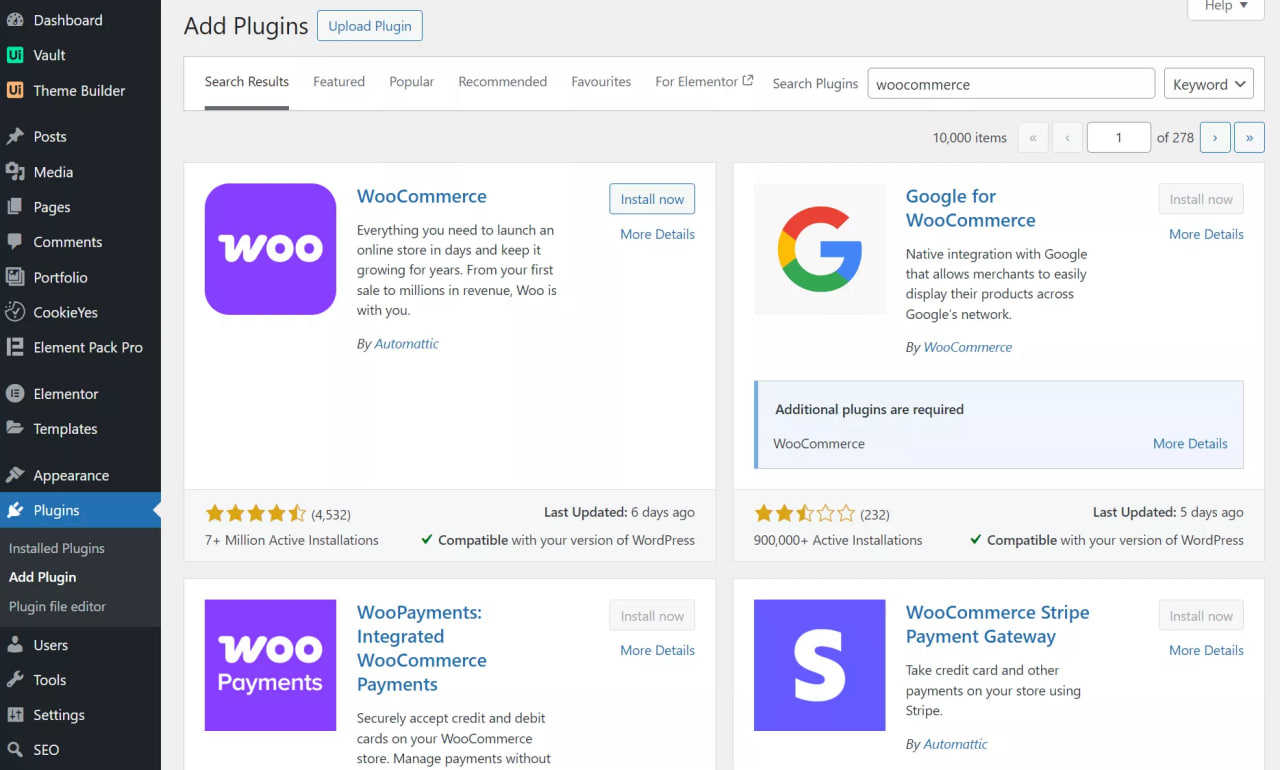
- Click Install Now on the official plugin
- Click Activate once installed
The Setup Wizard launches automatically. Key configurations include:
- Store Details: Address, currency, and tax location
- Industry: Select your product category
- Product Types: Choose physical products
- Payment Methods: Enable Stripe or PayPal immediately
- Shipping Zones: Create zones even though suppliers ship directly
Skip theme selection in the wizard — we’ll handle that separately.
Step 4 — Select a WooCommerce-ready theme
Your theme impacts performance and conversions. Essential features:
- Mobile responsiveness
- Fast loading times
- WooCommerce compatibility
- Multiple product display options
Installing a free theme:
- Navigate to Appearance > Themes > Add Theme
- Click the E-Commerce filter:
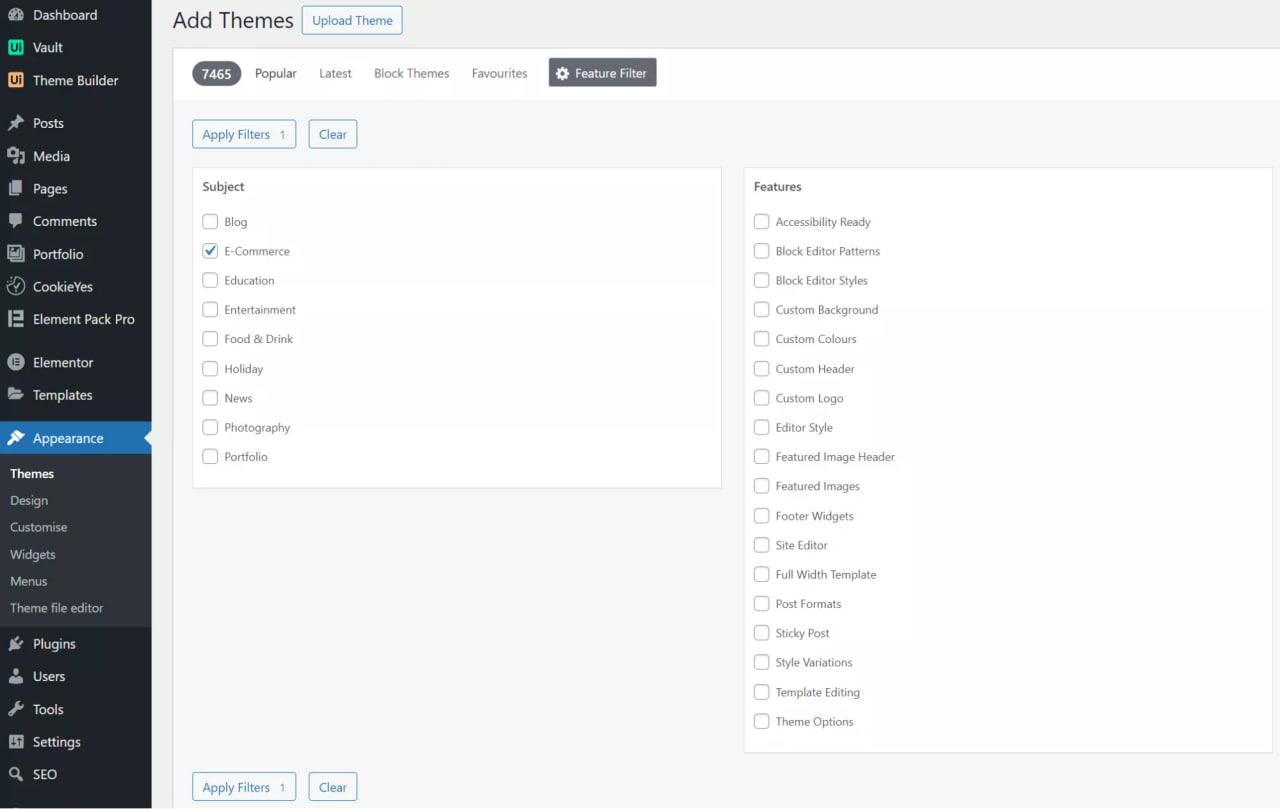
- Preview live demos before installing:
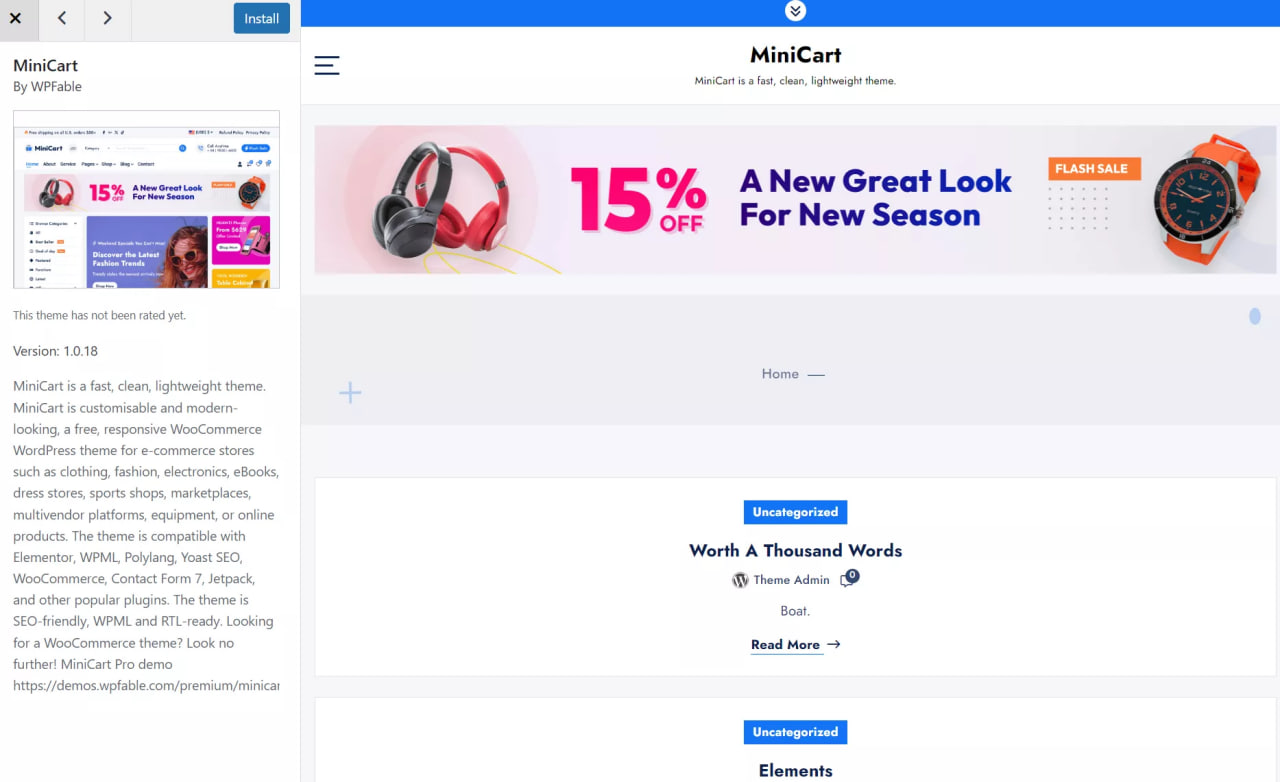
- Check the last updated date (ideally within the last three months)
- Click Install, then Activate
Premium themes offer:
- More in-built features, such as top bars
- Premium support
- Regular security updates
- Demos with one-click imports (perfect for getting started)
Step 5 — Connect dropshipping plugins
Link your store to suppliers:
- Research WooCommerce dropshipping plugins compatible with your suppliers
- Install via Plugins > Add New
- Enter API keys or supplier credentials
- Import product catalogs
- Set pricing rules and markups
Dropship plugins for WooCommerce automate inventory updates, order forwarding, and shipment tracking. However, configuration varies by supplier, so follow the instructions for each WooCommerce dropshipping plugin carefully.
How marketing automation helps grow your dropshipping store
Running a dropshipping store means competing for attention in crowded markets. You drive traffic, but visitors browse and leave. Carts get abandoned. First-time buyers never return.
Without systems to capture and nurture these opportunities, you’re burning ad spend on one-time interactions and spending a fortune to dropship on WooCommerce.
Email automation and additional flows for SMS and push notifications work around the clock to convert browsers into buyers and single purchases into repeat business. Omnisend provides the automation backbone your dropshipping store needs from day one.
Cart recovery automation
Omnisend’s abandoned cart workflows automatically email customers who leave items behind. Set the timing — for instance, one hour after abandonment, then 24 hours later if needed.
Each recovered cart directly adds to your bottom line without incurring additional ad costs. For dropshippers working with tight margins, every saved sale matters.
Welcome series for new subscribers
Your subscribers receive an automated sequence introducing your brand. Omnisend’s WooCommerce welcome emails let you showcase bestsellers, share your story, and offer first-purchase incentives.
New subscribers are your most engaged audience — welcome emails get opened far more than regular campaigns, making them perfect for building trust quickly.
Customer segmentation
Omnisend tracks how visitors interact with your store and automatically segments them based on their behavior. That means you can send tailored messages to first-time buyers or re-engaging people who just browsed.
You can even target customers based on products they viewed or reward your most loyal customers with exclusive offers.
Before you launch, set up Omnisend, the best email marketing plugin, to make the most of every visitor. You get one chance with early visitors — if they leave without buying or subscribing, you might never see them again. Automation captures these opportunities through abandoned cart reminders, product recommendations, and follow-ups, all while you stay focused on growing your store.
11 best WooCommerce dropshipping plugins reviewed
These are the best WooCommerce dropship apps in 2026:
How we tested
We tested each WooCommerce dropshipping plugin for two to three weeks to evaluate real-world performance. Our team checked the products, placed test orders, and contacted customer support with common questions.
We evaluated ease of setup, automation quality, pricing transparency, supplier reliability, and support response times.
Our WooCommerce team has 15+ years of combined ecommerce experience. We used the same criteria to test these WooCommerce dropshipping plugins to ensure fair comparisons.
This article was researched and written by our experts following a precise process.
See the process1. AliDropship
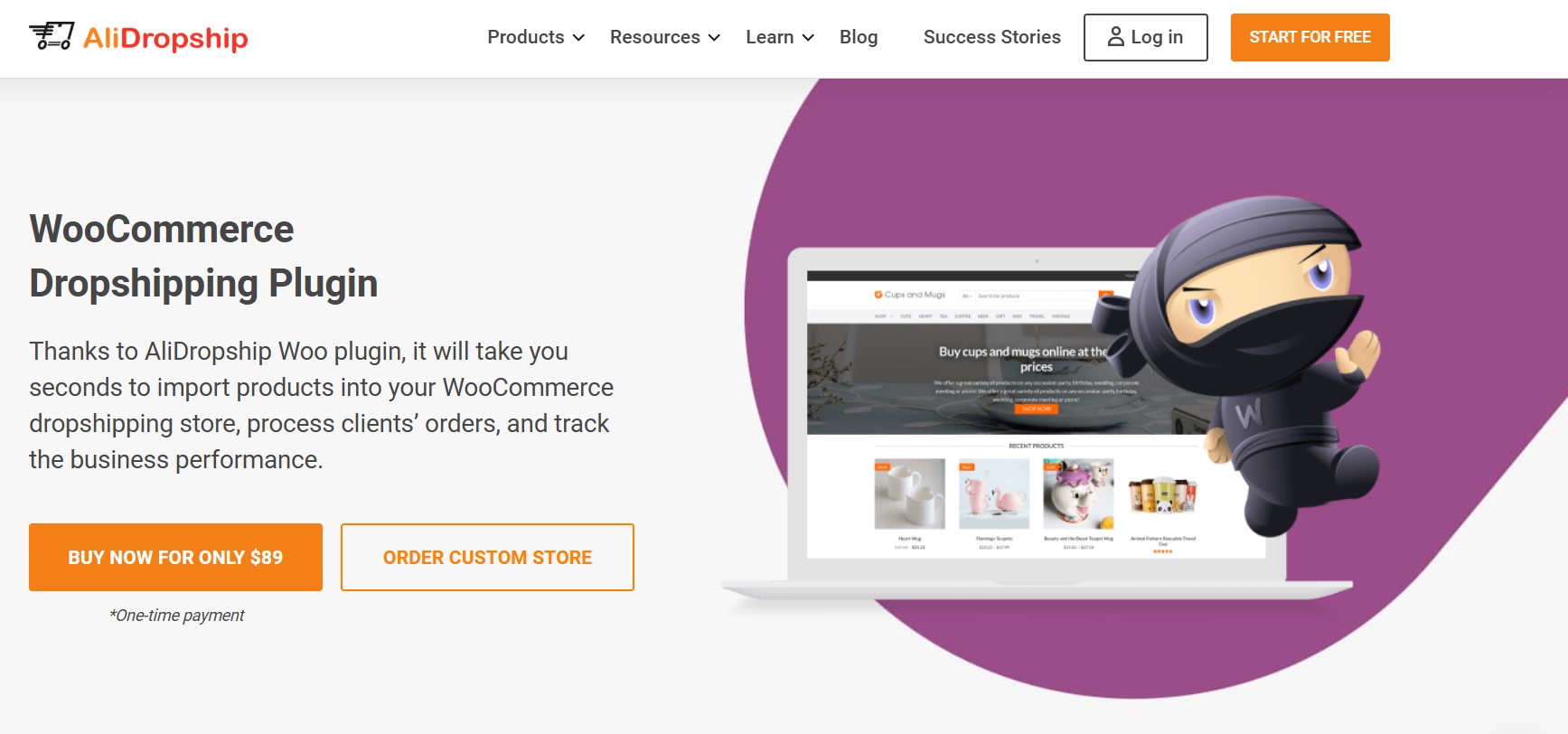
AliDropship connects your store to millions of AliExpress products and lets you import items with one click. You can also edit images to remove watermarks and configure the dropshipping plugin to place orders automatically when customers buy.
Set your profit margins once, and AliDropship calculates prices for every product. The Chrome extension lets you browse AliExpress and add products without leaving the supplier’s site.
Who it’s for
Choose AliDropship if you want to dropship from AliExpress without monthly fees eating into your profits. You only need to pay for this WooCommerce dropshipping plugin once.
Features
Order automation saves hours of manual processing. AliDropship places an order on AliExpress using the customer’s shipping information, tracks packages, and sends delivery updates. You handle customer service while the dropshipping plugin manages the technical details of fulfillment.
Pros
- One-time payment instead of monthly subscriptions
- Built-in image editor removes AliExpress watermarks
- Earn 8% cashback on all orders placed
- Chrome extension for faster product imports
- Automatic price markup formulas
- ePacket shipping filter included
Cons
- Only works with AliExpress suppliers
- Learning curve for pricing rules setup
- Customer support can be slow during peak times
- Some features require technical knowledge
Pricing
- AliDropship Plugin: $89 one-time payment
Why we recommend it
AliDropship suits you if you prefer owning dropshipping plugins outright. The $89 price equals three months of typical WooCommerce dropshipping plugins. Cashback earnings and lifetime updates make it cost-effective for long-term AliExpress dropshipping.
2. WooCommerce Dropshipping
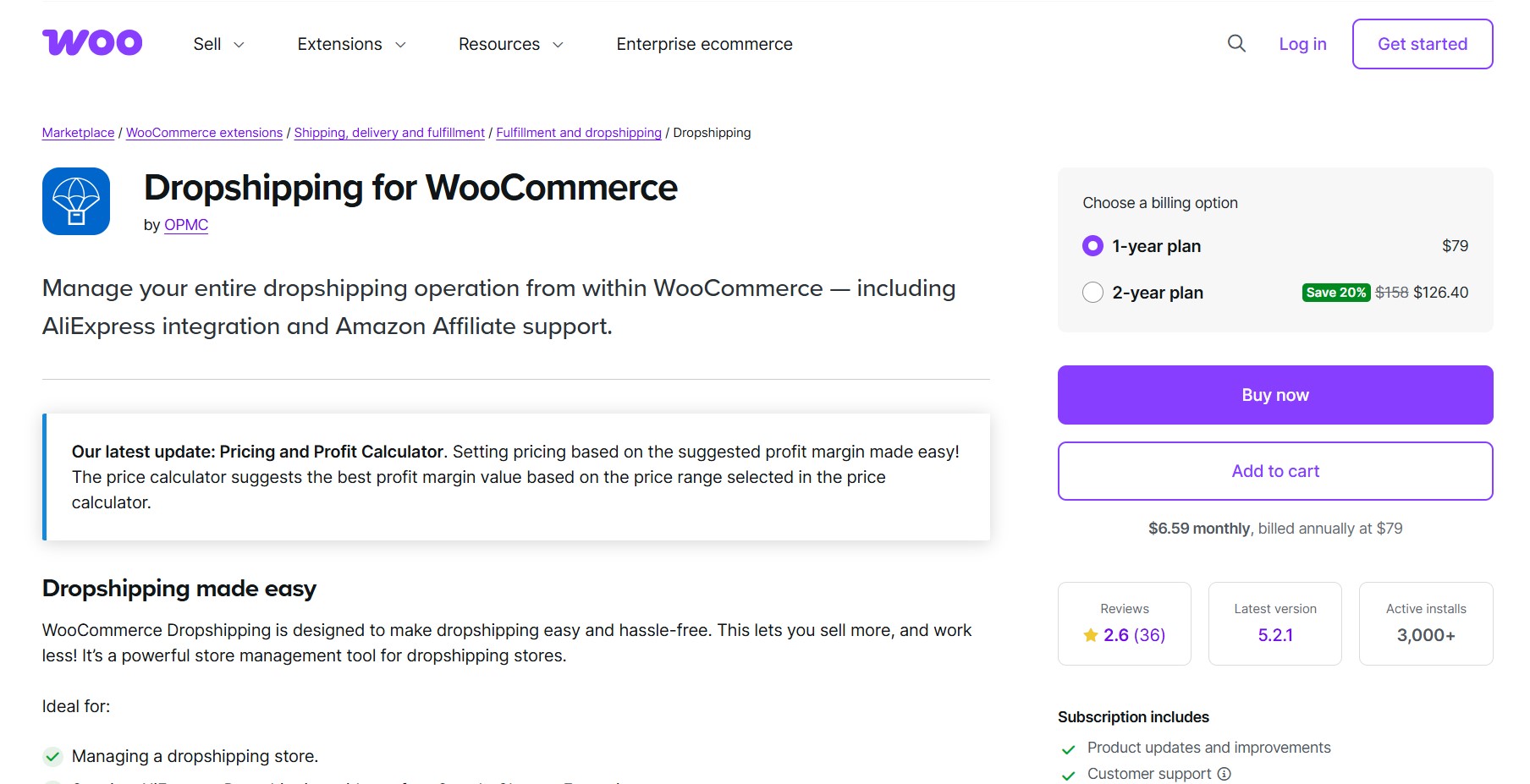
WooCommerce Dropshipping is the official dropshipping extension built by OPMC, a WooCommerce partner. It connects your store to AliExpress suppliers and supports Amazon affiliate integration for stores combining dropshipping with affiliate marketing.
This plugin automates order fulfillment by syncing inventory in real-time. It also forwards orders to suppliers when customers purchase. Here’s what this tool’s dashboard looks like:

Who it’s for
WooCommerce users wanting official integration backed by Automattic’s support team should choose this WooCommerce dropshipping plugin.
Features
WooCommerce Dropshipping has leveled up with a snazzy performance dashboard and a handy Pricing and Profit Calculator. Now you can effortlessly track your orders, profits, and stock levels in real time! Plus, the calculator helps you find the perfect mark-ups for your goals. With inventory sync and automatic supplier forwarding, you’ll have everything you need at your fingertips.
Also, inventory is continuously updated to prevent overselling. When a supplier’s stock changes, your store updates automatically within minutes.
Pros
- Official WooCommerce extension with guaranteed compatibility
- Regular updates aligned with WooCommerce releases
- Supports multiple suppliers through CSV imports
- Strong value for the feature set compared with third-party alternatives
- Straightforward integration with WooCommerce core functionality
- Dedicated performance dashboard to track orders, profit, and stock
- Built-in Pricing and Profit Calculator for smart mark-ups
- Backed by Automattic’s support infrastructure
Cons
- Limited advanced features vs specialized WooCommerce dropshipping plugins
- Requires a separate AliExpress account for product sourcing
- No built-in image editing features
- Fewer automation options than competitors
Pricing
- One-year plan: $6.59/month, billed annually at $79
- Two-year plan: $5.27/month, billed every two years at $126.4
Why we recommend it
Seamless integration with WooCommerce core means fewer conflicts and faster troubleshooting. If you value platform stability and official support over advanced features, this plugin delivers reliable dropshipping functionality at a fair price.
3. DropshipMe
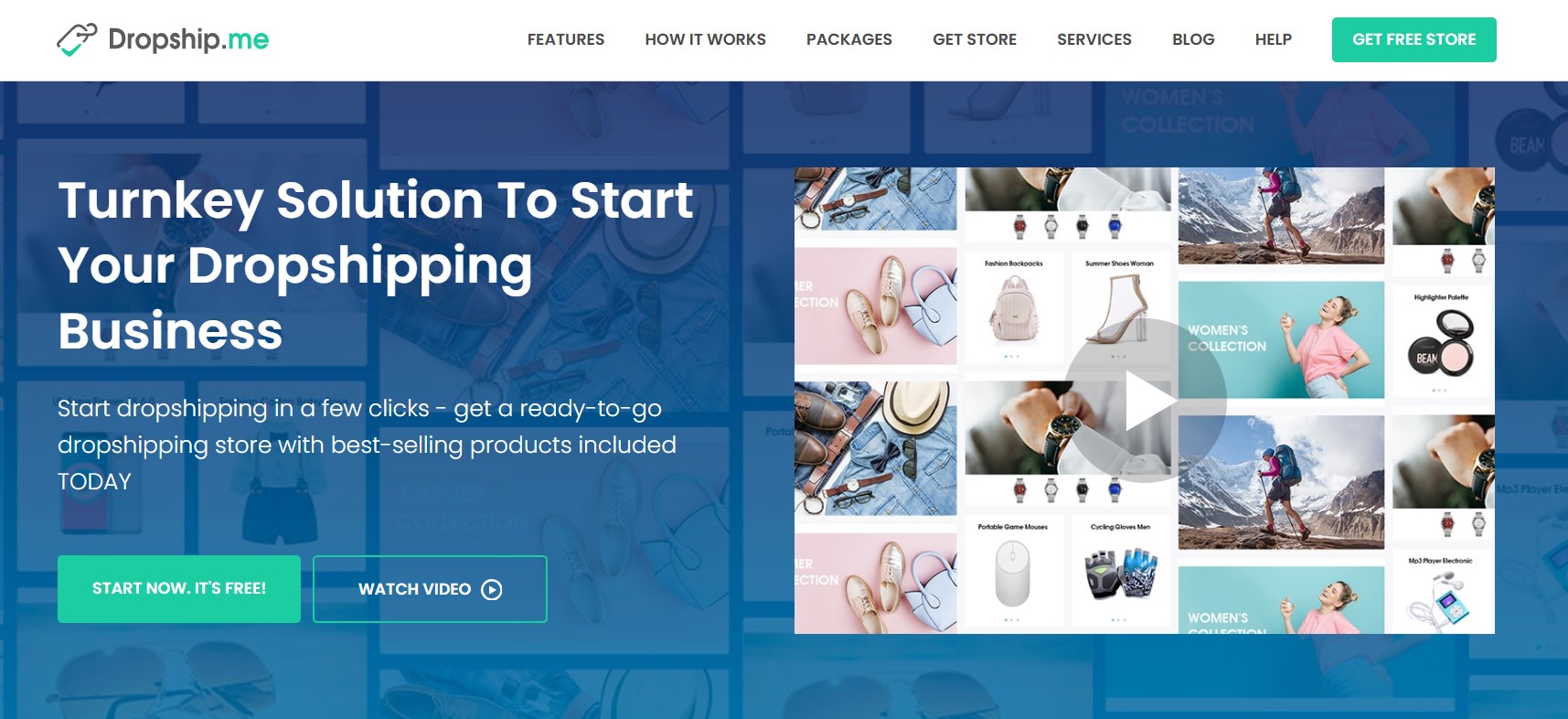
DropshipMe provides pre-made WordPress dropshipping stores with pre-selected AliExpress products. The package includes WordPress installation, WooCommerce setup, and a catalog of products with edited descriptions.
Each product in the catalog has been rewritten to remove supplier errors and improve readability. Images are edited, and titles are optimized for search engines before being added to your store (perfect if you want to get started with minimal effort).
Who it’s for
DropshipMe is the best free dropshipping plugin for WooCommerce if you need a complete store setup without handling technical configuration.
Features
The turnkey store comes with WordPress, WooCommerce, and essential dropshipping plugins already configured. Product listings include edited descriptions that read naturally instead of machine-translated text.
The catalog focuses on items with proven sales history from suppliers with high order volumes. You can filter products by category, price range, and supplier rating to build your initial inventory quickly.
Pros
- Complete WordPress store provided
- Products include rewritten descriptions
- Suppliers verified for reliability
- One-click product import
- Pre-configured payment systems
- No technical setup required
Cons
- Limited to AliExpress suppliers only
- Less control over initial store design
- Monthly fees for premium product access
- Can’t customize the automated setup process
Pricing
- 50 product imports: Free
- 100 product imports: One-time payment of $29 (+10 free imports)
- 500 product imports: One-time payment of $119 (+200 free imports)
- 1,000 product imports: One-time payment of $199 (+500 free imports)
Why we recommend it
If you want to start selling immediately without learning WordPress or WooCommerce, DropshipMe makes it easy. The edited product descriptions alone save hours of copywriting work.
4. WooDropship
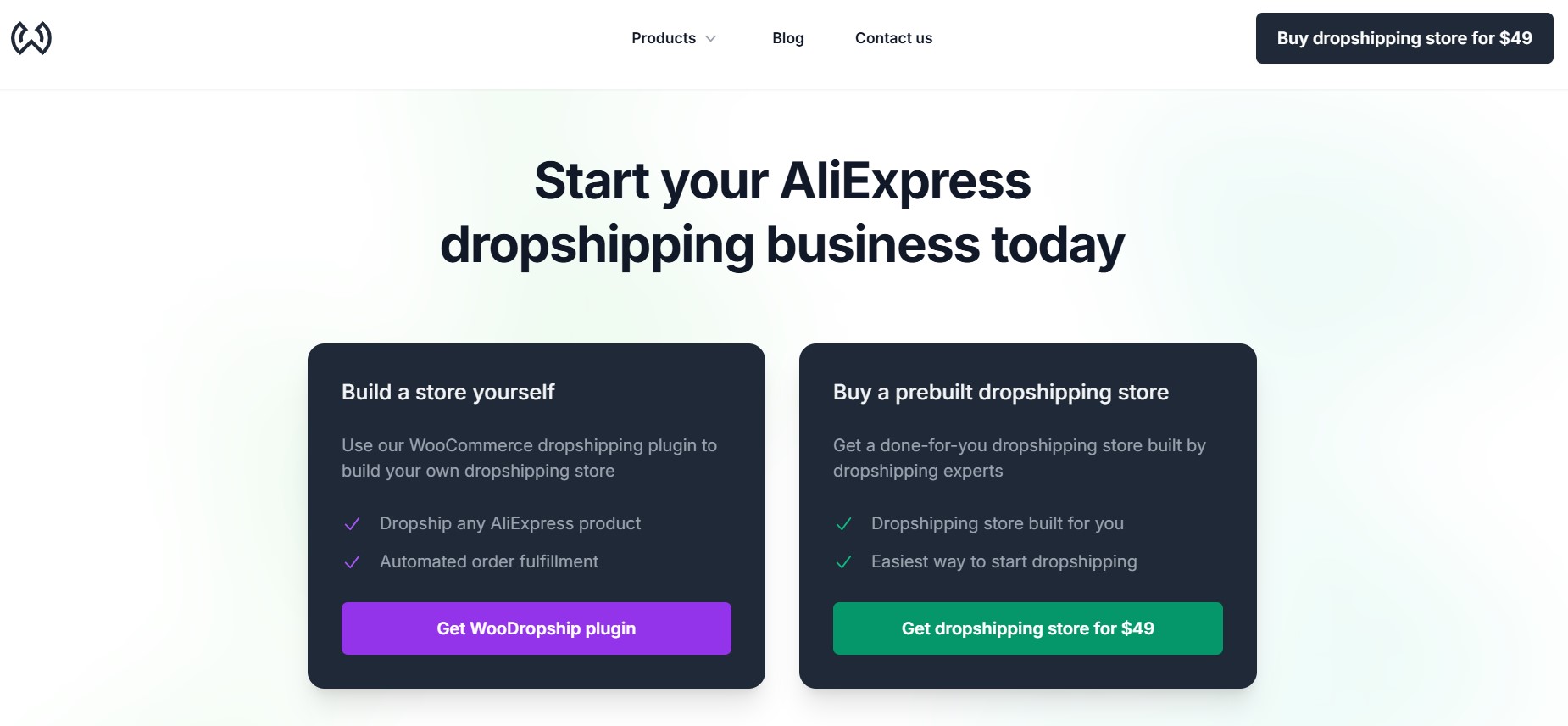
WooDropship provides two dropshipping options — build it yourself with a plugin or buy a pre-built store (plus the plugin) for $49. Both options connect to AliExpress for product sourcing and order fulfillment.
It automates product imports and order processing, and the pre-built stores arrive with products loaded and payment systems configured. You own everything outright with either choice.
Who it’s for
WooDropship is a fantastic dropshipping plugin for a WooCommerce store in 2026 if you want flexibility. Choose DIY with the plugin or sell immediately with a done-for-you store.
Features
The dual approach caters to different skill levels. Tech-savvy users can install the WooCommerce dropshipping plugin and customize everything. Beginners get a functioning store delivered in 12 hours.
Both options include AI-powered product description optimization. The Chrome extension integration lets you browse AliExpress and import products without switching platforms.
Pros
- Two entry points for different needs
- AI description rewriter included
- Store delivery in 12 hours
- One-time payment structure
- Chrome extension for faster imports
- Automated order fulfillment
Cons
- AliExpress-only supplier network
- Pre-built stores have limited design flexibility
- Customer support response varies
- Some automation features need manual setup
Pricing
- Pre-built dropshipping store: $49 for up to 20 pre-built stores
- WooDropship plugin: $89 one-time payment (includes free trial)
Why we recommend it
The dual pricing model lets you choose your starting point. If you’re unsure about handling technical setup, the pre-built store is a worthy option.
5. Zendrop
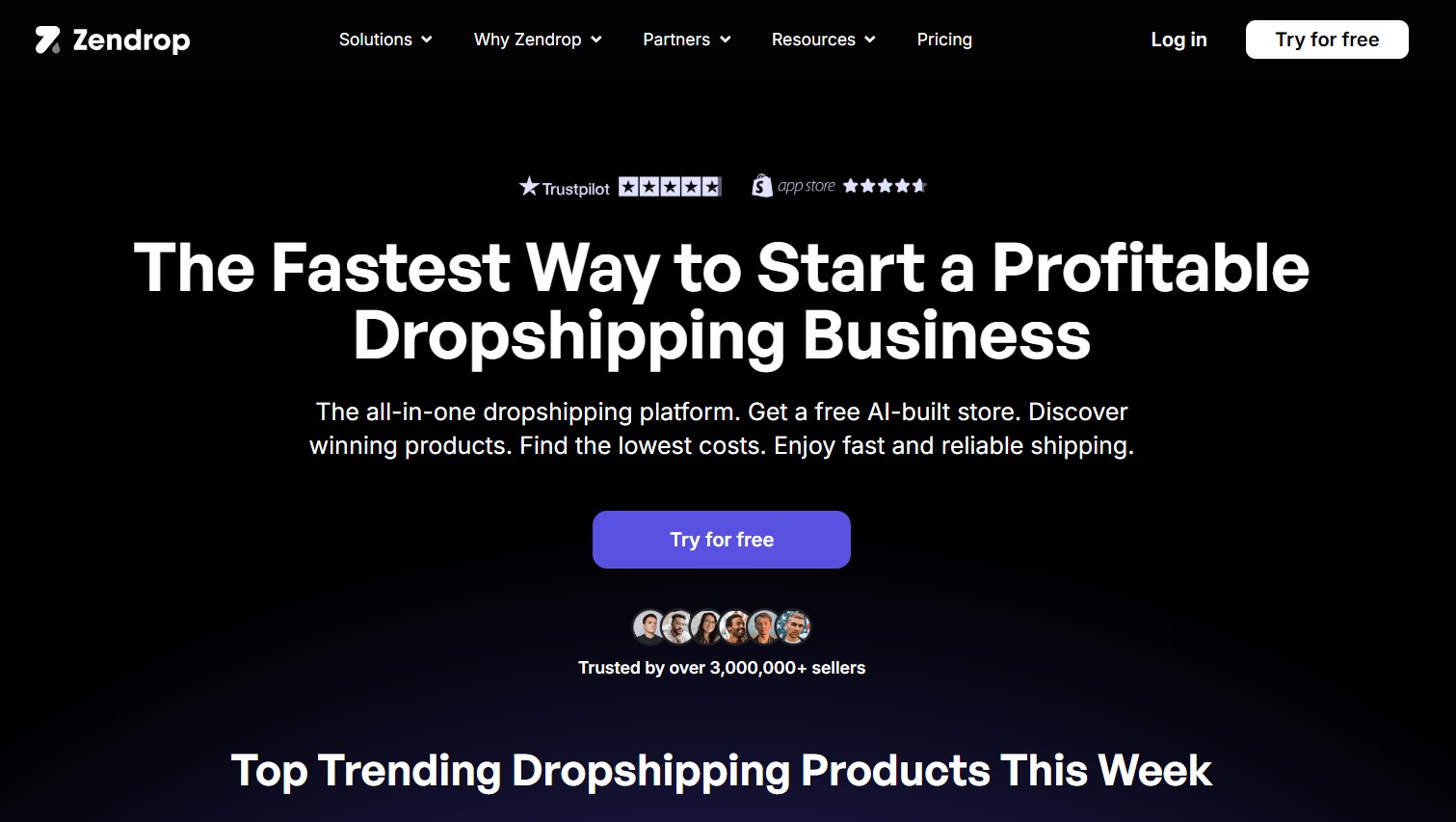
Zendrop combines dropshipping, print-on-demand, and 3PL services in one platform. Access over one million products, get AI-built stores, and choose between US- or China-based fulfillment centers.
Beyond basic product imports, Zendrop offers automated fulfillment, custom packaging options, and the ability to source products not listed in its catalog.
Who it’s for
Choose Zendrop if you want comprehensive ecommerce tools beyond basic dropshipping, including POD and warehousing options.
Features
Multi-channel fulfillment sets Zendrop apart from other WooCommerce dropshipping plugins. You can dropship traditional products, create custom print-on-demand items, or stock inventory in its warehouses. You’re not limited to one business model as you grow.
Its AI store builder creates a functioning site based on your product selections and target market. Weekly coaching sessions provide guidance on store optimization, marketing strategies, and conversion improvements.
Pros
- AI-built stores speed up launch
- US and China warehouse options
- Weekly coaching program included
- Custom packaging available
- Print-on-demand integration
- Multi-channel fulfillment support
Cons
- Higher monthly costs than basic WooCommerce dropshipping plugins
- Advanced features can be hard to learn
- Free plan has significant limitations
- Some fulfillment options require minimum order quantities
Pricing
- Free plan: Access to one million+ products, 24/7 support
- Pro: $49/month
- Plus: $79/month
Why we recommend it
If you want to grow beyond basic dropshipping into POD or holding inventory, Zendrop provides the infrastructure. The coaching alone justifies the monthly fee for new store owners.
6. Spocket
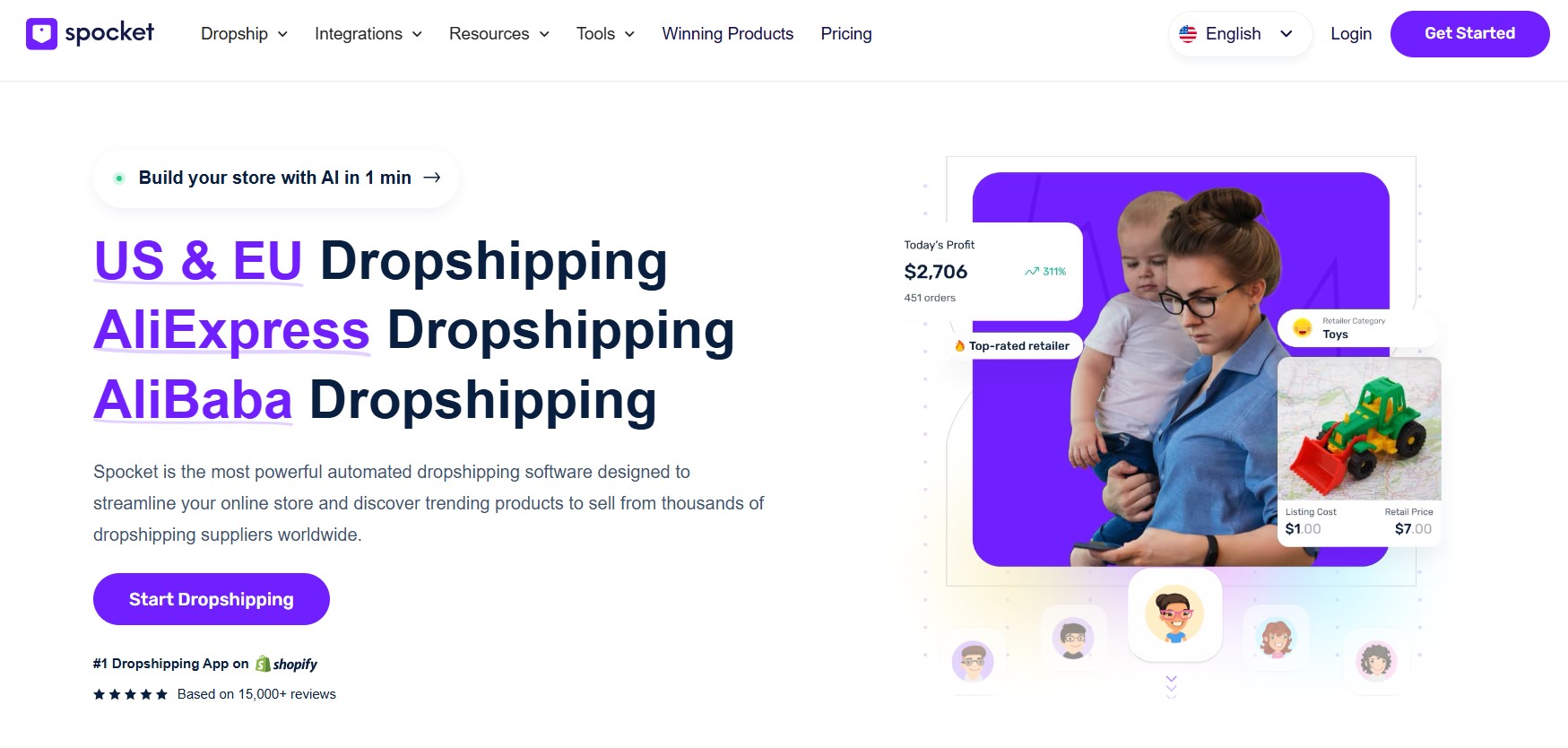
Spocket specializes in Western suppliers with fast shipping. Access 100 million products from US, EU, and Australian warehouses, eliminating month-long delivery times from China.
All paid plans include print-on-demand products, custom branding options, and the ability to chat with suppliers before ordering. Wholesale pricing offers margins up to 30% below retail.
Who it’s for
Spocket suits you best if fast shipping matters more than the lowest prices for your target market. It also works well if you’re selling to Western audiences who expect quick delivery or if you want to differentiate your store with reliable two- to five-day shipping.
Features
Supplier messaging sets Spocket apart from other WooCommerce dropshipping plugins. You can ask about minimum orders, request product samples, or get tracking updates directly from vendors.
Branded invoicing means packages arrive with your company details instead of generic supplier information. It’s also one of the few dropshipping plugins offering real-time inventory sync that prevents you from selling items that went out of stock an hour ago.
Pros
- Two to five-day shipping from the US and EU
- 14-day free trial
- Chat directly with suppliers
- Branded invoices available
- Up to 30% supplier discounts
- Print-on-demand integration
Cons
- Higher product costs than AliExpress
- Product limits on lower tiers
- Monthly fees add up quickly
- Premium products cost extra
Pricing
- Starter: $39.99/month
- Professional: $59.99/month
- Empire: $99.99/month
- Unicorn: $299.99/month
Why we recommend it
Spocket makes sense if you’re targeting customers who expect Amazon-style delivery times. You’ll pay more for products, but reduce refunds and complaints about shipping. Also, the ability to message suppliers directly helps you resolve issues quickly and build relationships.
7. Syncee
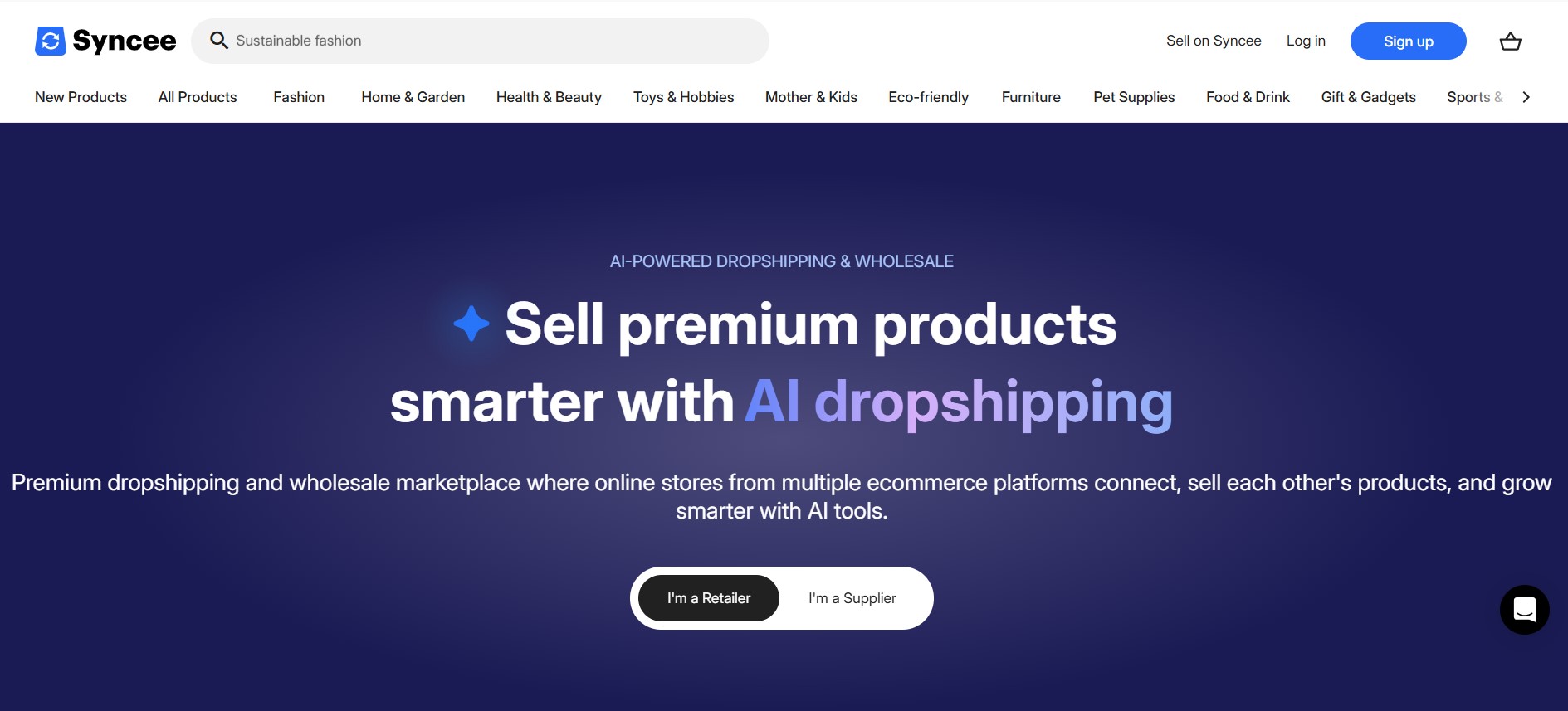
Syncee connects you to over 12,000 independent brands offering both dropshipping and wholesale options. The WooCommerce dropshipping plugin combines multiple suppliers in one checkout. This prevents customers from managing separate orders when buying from different vendors.
AI recommendations suggest products based on your store’s existing inventory and target audience. The multi-supplier checkout automation handles split orders across vendors without manual intervention.
Who it’s for
Sellers wanting unique products from smaller brands rather than mass-market AliExpress items should choose Syncee. It works well for niche stores building curated collections.
Features
The massive list of independent brands gives you access to products that competitors won’t have. Many suppliers offer both dropshipping and wholesale, letting you test products before buying inventory.
AI product recommendations analyze your current catalog and suggest complementary items. This helps you build a cohesive store instead of randomly adding products.
Pros
- 12,000+ vetted suppliers
- Combines dropshipping and wholesale
- AI-powered product recommendations
- Multi-supplier checkout automation
- Access to unique, niche products
- Real-time inventory synchronization
Cons
- Smaller product selection than AliExpress-focused dropshipping plugins
- Higher minimum order requirements from some suppliers
- Learning curve for supplier vetting
- Premium features are locked behind higher tiers
Pricing
- Free: Browse only, five AI searches
- Basic: $39.99/month, 50 products to import, five import lists
- Pro: $59.99/month, 250 products to import, unlimited suppliers
- Business: $99.99/month, 10,000 products, private suppliers
- Plus: $299.99, 50,000 products, 100 AI assistance, 24/7 support
Why we recommend it
Syncee’s independent brand network helps you avoid selling similar products as every other dropshipper, which justifies its pricing. The wholesale option also lets you move to holding inventory as you grow.
8. Sharkdropship
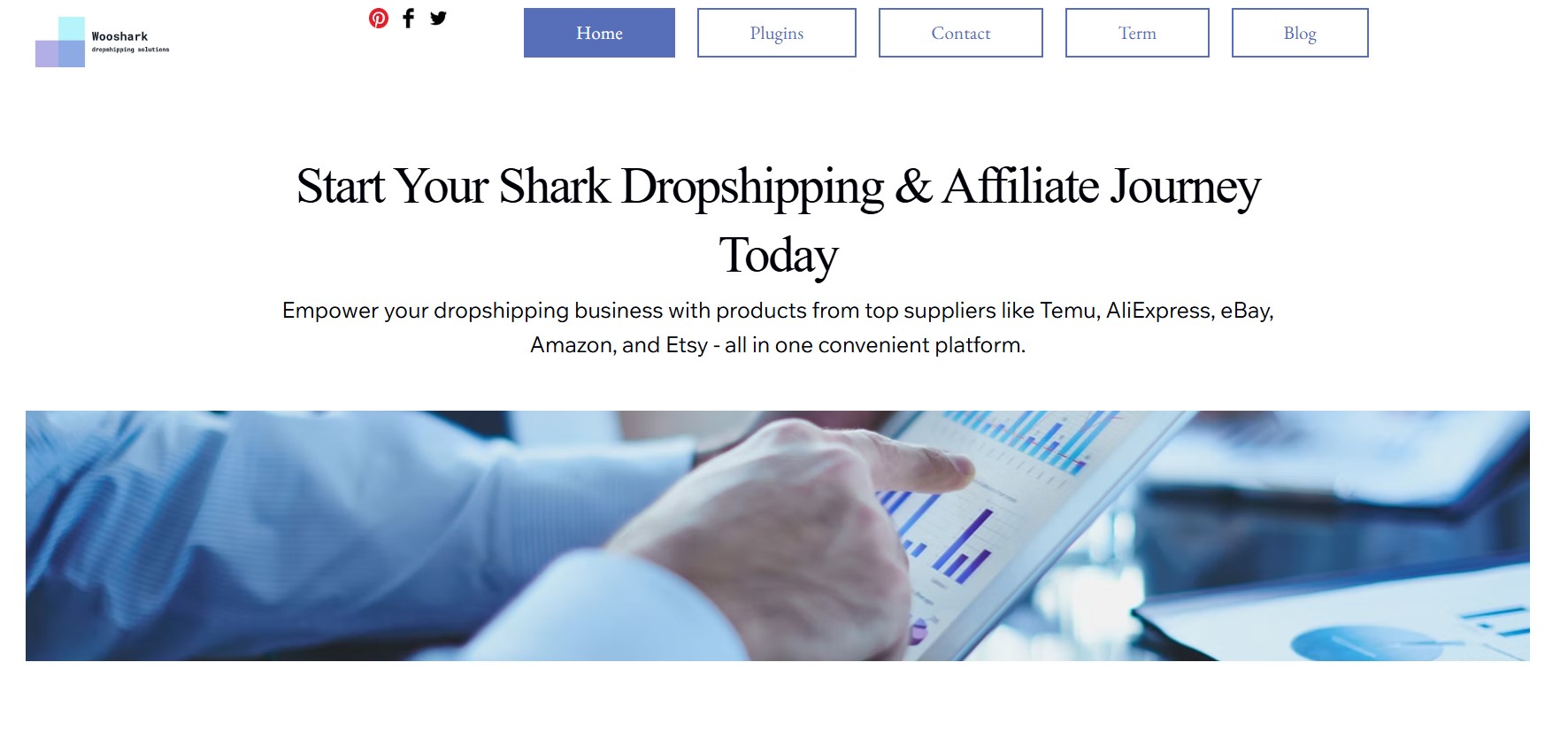
Sharkdropship offers both dropshipping and affiliate marketing in one plugin. The Chrome extension works across 52+ languages and handles bulk product imports from AliExpress.
You can switch between dropshipping mode (where you fulfill orders) and affiliate mode (where you earn commissions on clicks). This dual functionality lets you test which model works better for specific products.
Who it’s for
Occasional sellers wanting flexibility between dropshipping and affiliate marketing should choose Sharkdropship. It works well if you’re experimenting with both business models.
Features
The dual dropship/affiliate functionality offers options. Promote high-ticket items as an affiliate to avoid handling returns while dropshipping smaller products with better margins.
Bulk import handles thousands of products at once. The Chrome extension integration means you can browse AliExpress normally and import items with a single click.
Pros
- Dual dropshipping and affiliate options
- Chrome extension included
- Multi-language support
- Bulk import capability
- One-time payment option
- Low entry price point
Cons
- Limited to AliExpress products
- Basic automation compared to premium WooCommerce dropshipping plugins
- Potentially slow support response
- Fewer features than specialized tools
Pricing
- One-store license: €19.99/year ($23.19/year)
- Five-store license: €39.99/year ($46.38/year)
Why we recommend it
Sharkdropship is one of the best WordPress dropshipping plugins if you want additional affiliate options. The ability to import products as affiliate links gives you an alternative revenue stream when margins are thin.
9. Dropified
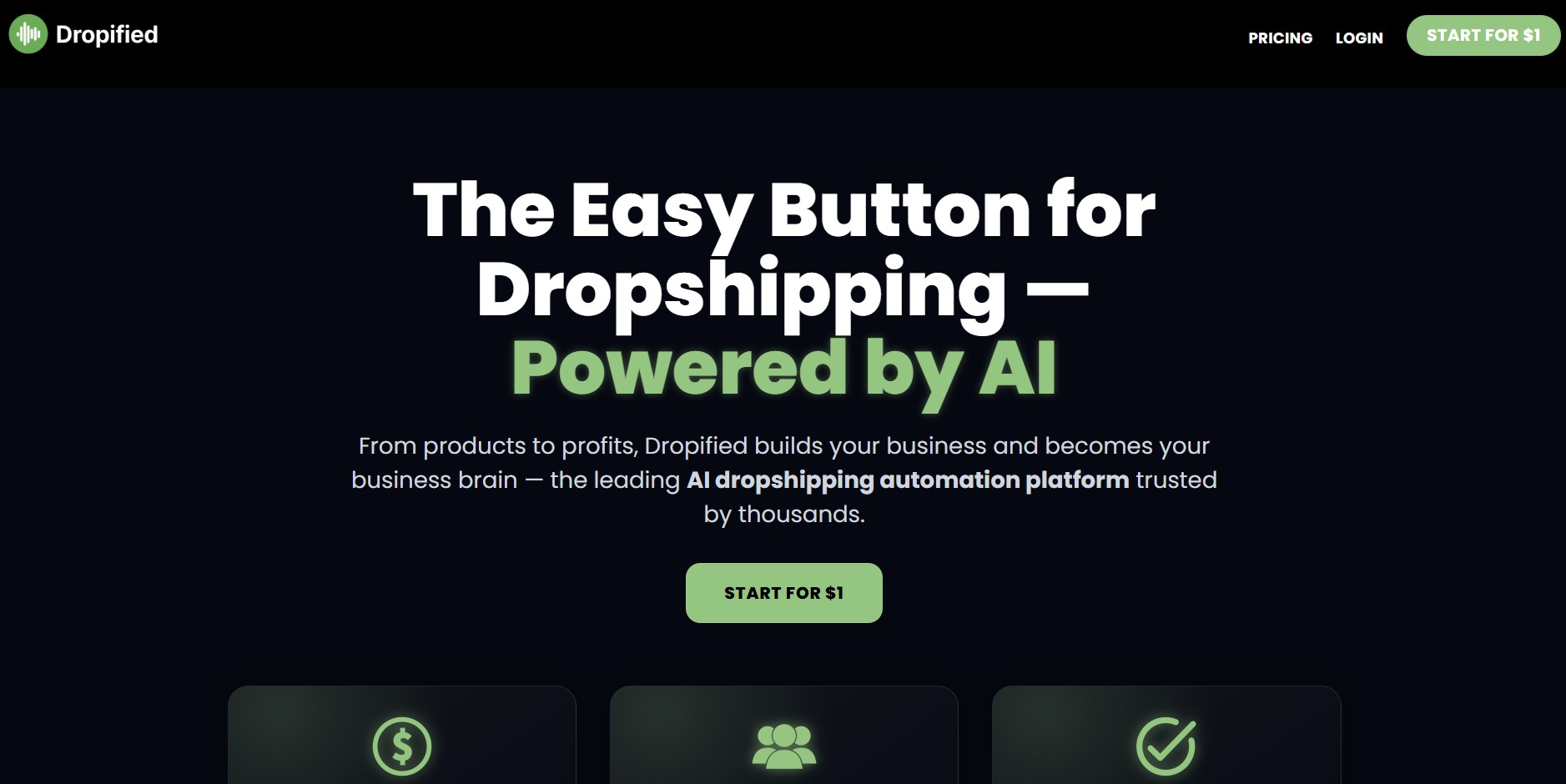
Dropified supports multiple suppliers beyond AliExpress, including Amazon, Walmart, and Etsy. The AI digital product creator generates printables and digital goods, while the order bot handles fulfillment across platforms.
Multi-vendor mapping lets you source the same product from different suppliers and automatically switch if your primary option runs out. By avoiding inventory issues, you can prevent lost sales.
Who it’s for
Multi-store managers needing advanced automation across different platforms should choose Dropified. It works best when managing several stores or sourcing from multiple marketplaces.
Features
One-click order processing eliminates manual data entry. The Order Bot fills in customer details, switches between suppliers automatically, and handles custom product requests.
Multi-vendor mapping lets you link different suppliers to product variants — if one runs out of stock, orders route to your backup vendor without intervention.
Pros
- Multi-supplier platform support
- AI digital product creator
- Automated order bot
- Multi-vendor product mapping
- Advanced automation workflows
- Supports multiple store management
Cons
- Steeper learning curve than simpler WooCommerce dropshipping plugins
- AI features have additional costs
- Some features require premium tiers
- Complex setup for basic users
Pricing
- Monthly: $50/month, one ecommerce store, unlimited products
- Annual: $25/month (billed annually), same features as monthly pricing
- Enterprise: $500/month, unlimited stores, priority support
Why we recommend it
If you’re running multiple stores or need sophisticated supplier management, Dropified’s automation saves hours weekly. The multi-vendor mapping alone prevents stockout losses.
10. ALD — Dropshipping and Fulfillment for AliExpress and WooCommerce
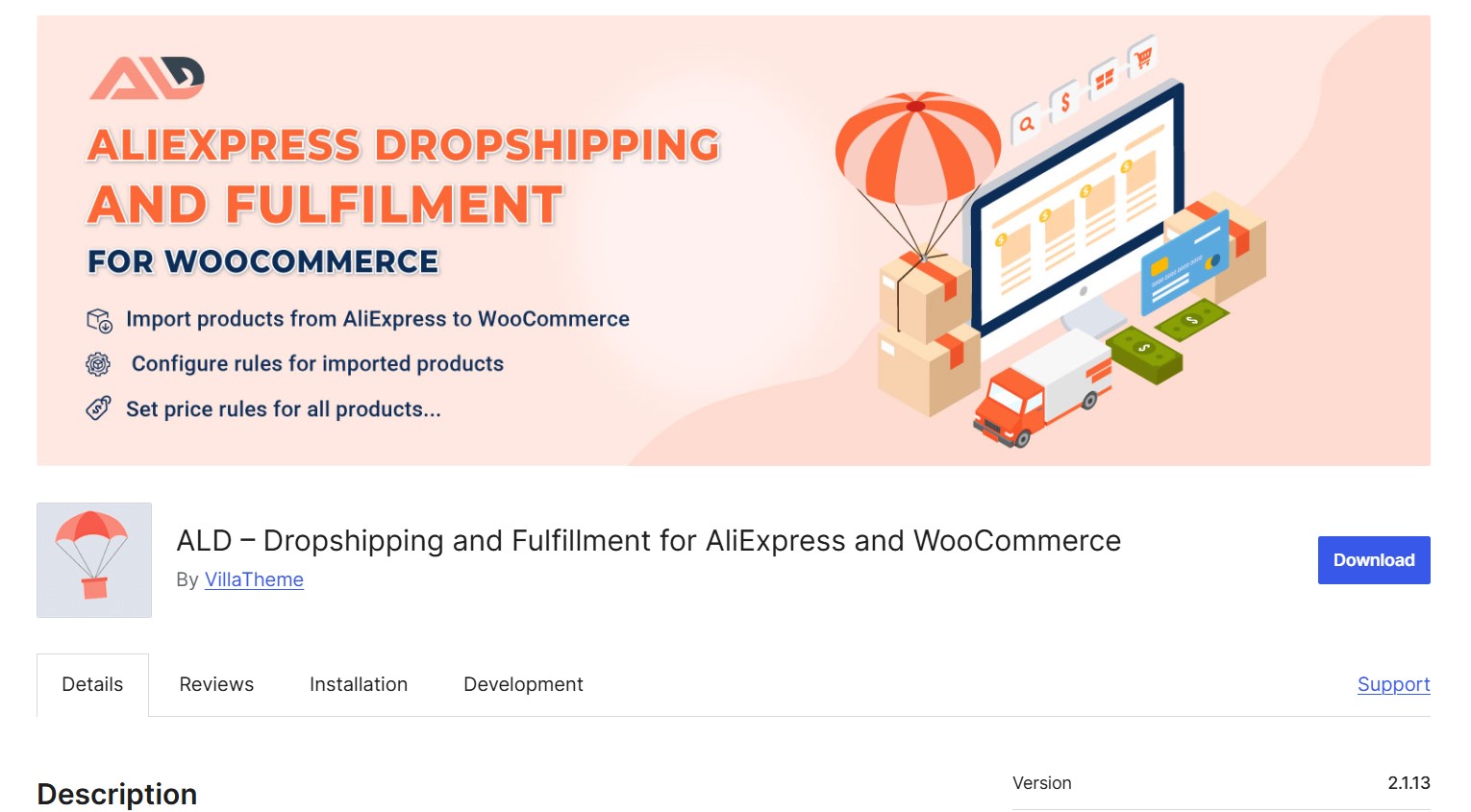
ALD offers advanced pricing rules and a variation splitter for AliExpress products. API fulfillment handles order processing, while product migration tools help you move catalogs between stores.
The pricing engine lets you set different markup rules based on product cost, category, or supplier. This control level helps you maintain consistent margins across thousands of products.
Who it’s for
Advanced users wanting detailed control over AliExpress product imports and pricing should choose ALD.
Features
Advanced pricing rules let you create complex markup formulas. Set higher margins on low-cost items to cover transaction fees while keeping competitive pricing on expensive products.
The variation splitter breaks AliExpress products with multiple options into separate WooCommerce products. This improves SEO and product pages.
Pros
- Advanced pricing rule engine
- Variation splitter for complex products
- API-based fulfillment automation
- Product migration between stores
- Granular control over imports
- Free plan available
Cons
- Complex interface for beginners
- Limited supplier network (AliExpress only)
- Requires understanding of pricing strategy
- Some features need paid plans
Pricing
- Regular license: $32 one-time, all features, six months support
- Extended license: $250 one-time, lets you use the plugin for clients
Why we recommend it
If you’re managing thousands of products and need precise pricing control, ALD’s rule engine saves you from manually adjusting margins. The variation splitter also improves how complex products appear to customers.
11. Importify
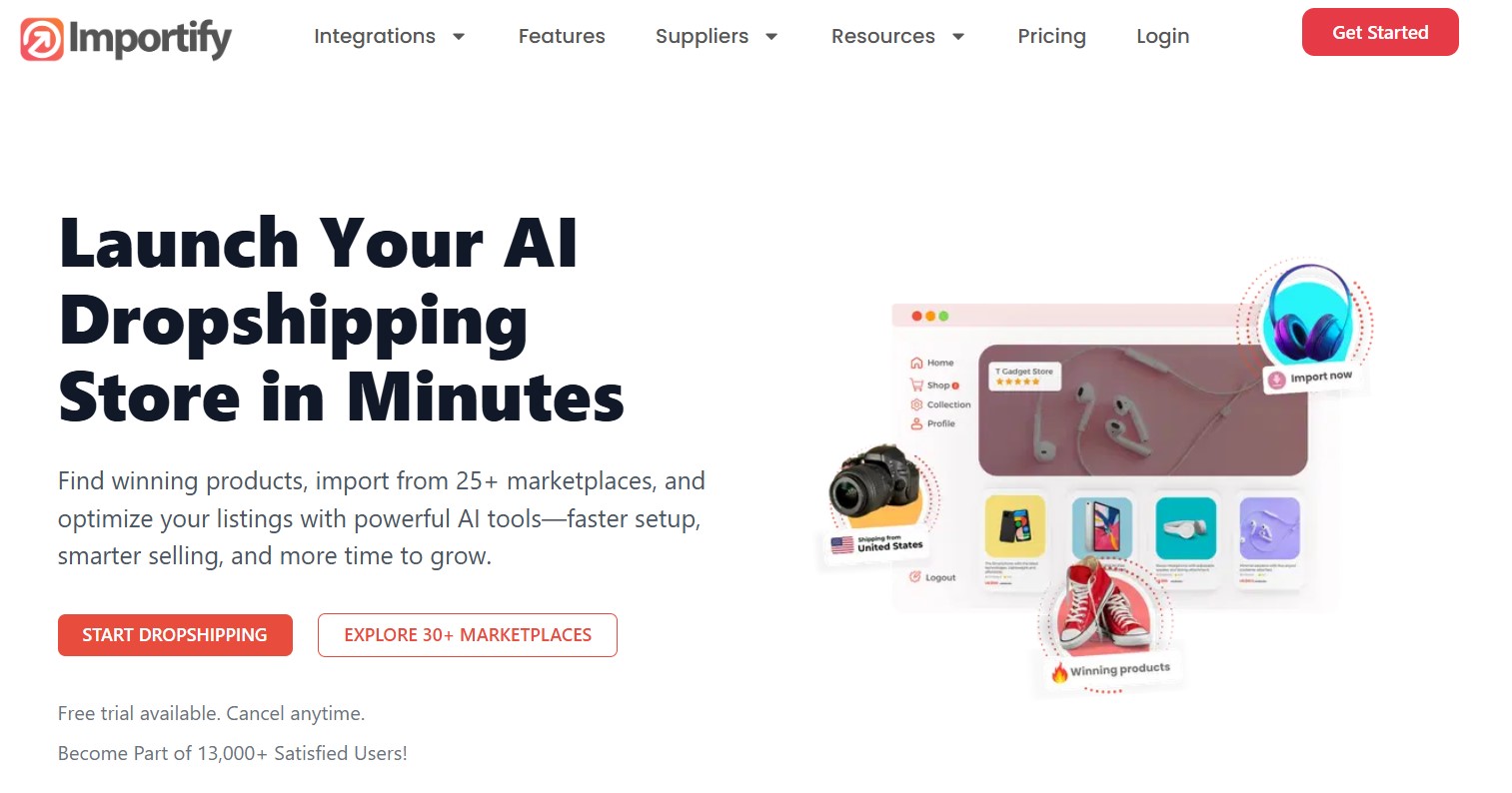
Importify imports products from 25+ marketplaces, including AliExpress, Amazon, Alibaba, Etsy, and Walmart. The AI Product Optimizer rewrites descriptions using GPT-4.1, while translation tools help you sell in 20+ languages.
Cross-platform migration lets you import products from any public Shopify store. Smart pricing rules, variant splitting, and automatic currency conversion handle the technical details of managing a multi-supplier catalog.
Who it’s for
Importify suits you best if you source from multiple marketplaces and want AI-powered content optimization for better conversions.
Features
AI-powered content rewriting takes generic supplier descriptions and turns them into benefit-driven copy without manual editing. Just define your brand voice and target audience, and the AI generates FAQ sections and trust badges automatically.
One-click translation opens international markets without hiring translators. There’s also a variant splitter that breaks complex listings into separate products for cleaner catalogs.
Pros
- 25+ marketplace support
- GPT-4.1 content optimizer
- 20+ language translation
- Shopify store migration
- Automatic currency conversion
- Split variant products
Cons
- AI features require an API key
- Premium pricing structure
- Amazon is limited to paid plans
- Manual fulfillment for most suppliers
Pricing
- Basic: $14.95/month, import from 25+ marketplaces
- Premium: $27.95/month, AI features with API key
- Gold: $37.95/month, automatic AliExpress fulfillment
Why we recommend it
Importify shines when you need professional product descriptions fast. Multi-marketplace support means you can test products from different sources without juggling multiple plugins, and translation features make international expansion simple.
Find reliable WooCommerce dropshipping suppliers
Your dropshippers affect your profit margins, product availability, and customer satisfaction. In other words, they are the crucial link in building and growing a successful store. You need partners who maintain inventory, ship fast, and handle returns professionally.
Here’s where to find them:
- AliExpress suppliers — Filter by 95%+ ratings, 1,000+ orders, and ePacket shipping availability. Message sellers directly to negotiate terms and test communication.
- Direct manufacturer outreach — Search [product type] manufacturer and contact companies directly. Many offer dropshipping programs that they don’t advertise publicly.
- US/EU warehouses — Look for suppliers shipping from domestic warehouses. Two-day delivery beats three-week shipping from Asia.
- Trade shows — Canton Fair and ASD Market Week give you access to hundreds of suppliers under one roof. You can handle products and negotiate in person.
- Niche wholesale directories — Look for directories focused on single industries (beauty, electronics, outdoor gear). They will connect you with specialized suppliers.
- Supplier directories — Platforms like SaleHoo and Doba provide vetted supplier lists across multiple product categories. These directories charge membership fees but save time by pre-screening suppliers for reliability.
Supplier evaluation checklist
Before partnering with any supplier:
- Order product samples — Test quality and measure actual shipping times
- Send test messages — Check response speed and English proficiency
- Verify warehouse locations — Confirm where products ship from
- Request business credentials — Get company registration numbers and tax IDs
- Place trial orders — Experience their fulfillment process as a customer
- Check inventory systems — Ensure real-time stock updates to prevent overselling
- Clarify defect handling — Know who covers return shipping and refunds
- Compare pricing tiers — Get quotes for different order volumes
Common supplier red flags
Watch out for these warning signs:
- Upfront payment demands without product samples — Legitimate suppliers send samples before requiring you to commit
- No direct phone contact or verified business address — Professional suppliers maintain transparent business locations
- Prices 70%+ below market rate — Extreme discounts often signal potential quality issues
- Refusal to provide business registration or tax ID — Credible suppliers share verification documents readily
- Poor English communication if targeting English markets — Communication barriers lead to order errors and customer complaints
- No clear return/refund policy — Professional suppliers establish transparent defect resolution procedures
- Negative reviews from other dropshippers — Check supplier reputation across multiple WooCommerce dropshipping plugins
- Resistance to sending product samples — Quality suppliers welcome product evaluation requests
If a supplier checks multiple boxes above, move on. One bad supplier can destroy months of marketing work through late shipments or quality complaints.
Building strong supplier relationships
Strong partnerships improve your business over time. Here’s how to deepen your relationship with suppliers:
- Start with small test orders — Prove reliability on both sides before scaling volume
- Maintain regular communication — Update suppliers on expected order volume and seasonal changes
- Pay invoices promptly — Consistent payment builds trust and improves service priority
- Provide feedback on quality issues constructively — Help suppliers improve rather than simply complaining
- Negotiate better terms after proving reliability — Request volume discounts once you demonstrate consistent orders
- Ask about exclusive arrangements for bestsellers — Lock in competitive advantages on popular products
Marketing tips for your WooCommerce dropshipping business
Every visitor costs money to acquire. No matter if they find you via paid ads, social media, or search, you need systems to convert that initial interest into purchases.
Your biggest profits in dropshipping come from turning one-time buyers into loyal customers and browsers into subscribers. Email marketing is the best way to do that.
Omnichannel marketing with Omnisend
Omnisend helps you build your subscriber list with signup forms for email and SMS marketing. You can then create automation messages that include email, SMS, and push notifications to reach your customers wherever they are.
Each touchpoint builds toward a sale. Here are some examples:
Welcome series for new subscribers
New subscribers want to hear from you. Your welcome series is the first message you send, usually with a discount to reward them for signing up. You can then send additional messages to nurture them.
Omnisend’s WooCommerce welcome emails let you showcase bestsellers, share your story, and offer first-purchase incentives.
Your flow might look like this:
- Email one (immediate): Deliver the promised discount + showcase five bestsellers
- Subject line example: “Here’s your 15% off! Plus our five bestsellers”
- Email two (day three): Share bestsellers and customer testimonials
- Subject line example: “See why 10,000+ customers love us”
- Email three (day seven): Highlight product categories and explain your policies
- Subject line example: “Everything you need to know before you shop”
Here’s a screenshot from Omnisend’s automation builder, showing a welcome series flow containing one email sent one minute after subscription:
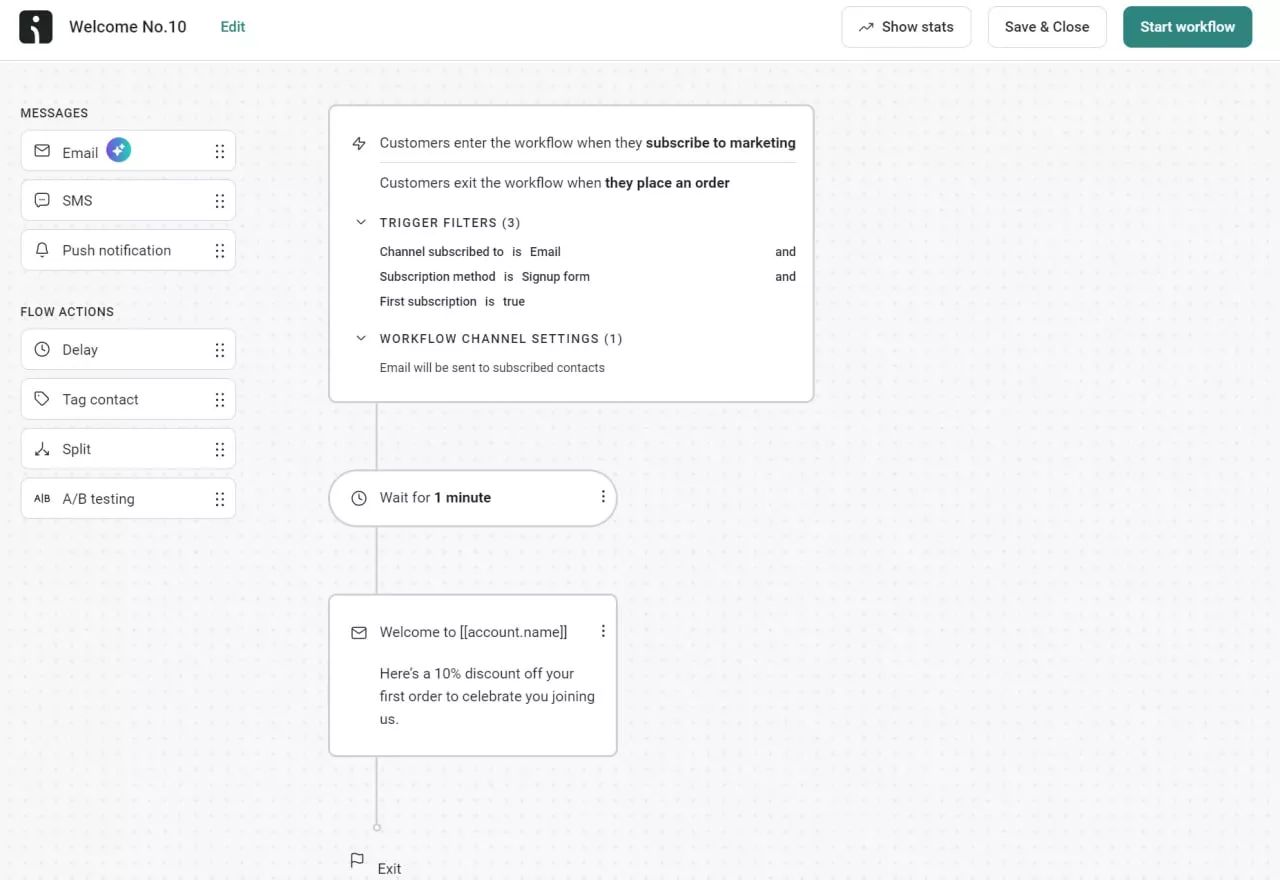
Test different discount amounts in your welcome email — some stores find a discount works better than an offer like free shipping.
Abandoned cart recovery
Cart abandonment happens for dozens of reasons. Your email sequence addresses the main objections.
Omnisend’s abandoned cart workflows automatically email customers who leave items behind. Set the timing — for instance, one hour after abandonment, then 24 hours later if needed.
Your flow might look like this:
- Email one (one hour): A simple reminder with a cart image and a checkout button
- Subject line example: “You left something behind”
- Email two (24 hours): Add social proof, something that shows satisfied customers using your product
- Subject line example: “Still thinking it over? Here’s what others say”
- Email three (72 hours): Create urgency with your subject line
- Subject line example: “Last chance! Your cart expires + 10% off”
Most recovered carts come from the first email, but the second and third still generate sales. Omnisend shows you which WooCommerce abandoned cart emails drive the most revenue. This allows you to adjust timing and messaging. Here’s an example of an abandoned cart flow:
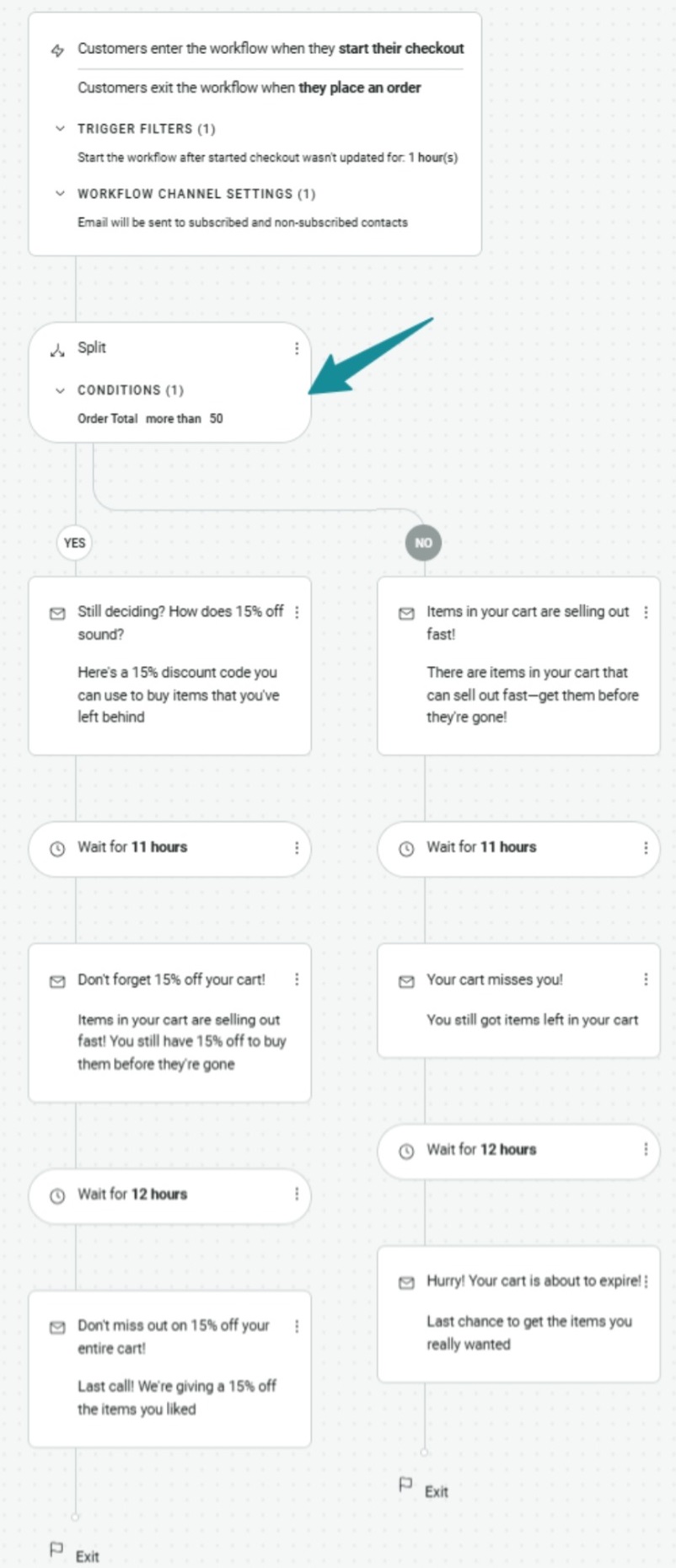
Post-purchase follow-ups
Your relationship with customers shouldn’t end at checkout. Re-engage them to get repeat sales.
Your WooCommerce store and dropshipping suppliers will handle these emails:
- Order confirmations: Includes tracking info, delivery dates, and care instructions
- Shipping notification: Usually handled by your courier
However, don’t skip thank-you emails. These messages set the tone for your brand after purchase and help build trust from day one.
You can then follow up with the following messages:
- Review request: Ask after seven days when customers have likely used the product
- Subject line example: “How’s your [product name] working out?”
- Cross-sell email: Suggest related items one week later
- Subject line example: “You might also like these…”
For cross-sells, relevance matters. Someone who bought yoga mats might want resistance bands or workout clothes, not random fitness equipment. Recommend items based on what they purchased.
Segmentation for targeted campaigns
Your customers’ needs vary based on multiple factors and preferences, such as location and purchase history. Omnisend tracks what customers do on your site and segments them automatically.
Send different messages to people who have made a purchase versus those who have just browsed. You can also target customers based on which products they viewed and create special campaigns for your most loyal customers.
Email segmentation entails sending relevant messages that drive sales. Example segments include:
- VIP customers: Over three purchases, $500+ spent, offer early access to new products
- Dormant customers: “We miss you” reactivation offers for those with no purchase in over 90 days
- Browse abandoners: “Still interested?” emails featuring the products the customers viewed
- Location segments: Weather-based product recommendations for different regions
Omnisend provides pre-built segments that are ready to use. Here’s an image of its most popular segments:
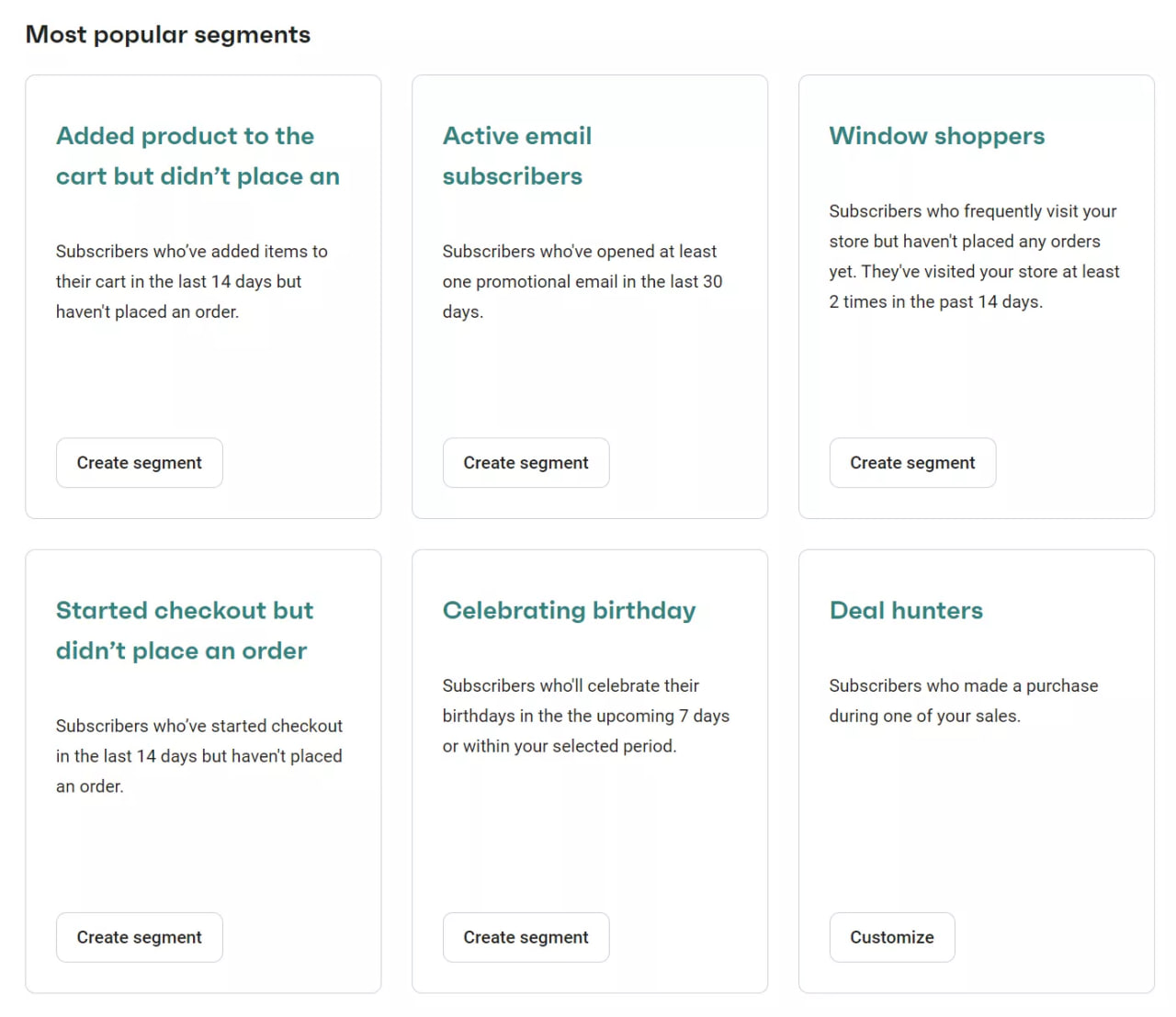
You can also create segments from scratch with custom filters. For instance, you could build a segment to target customers close to renewals.
SMS marketing with Omnisend
Text messages get opened within minutes. Reserve them for urgent updates and limited-time offers that need immediate attention.
Order updates via SMS
Keep shipping notifications brief. Include the order number and tracking link only. Customers appreciate these updates because they don’t have to check their email or log into your store. Omnisend automatically sends these when your supplier marks orders as shipped.
A typical message looks like this:
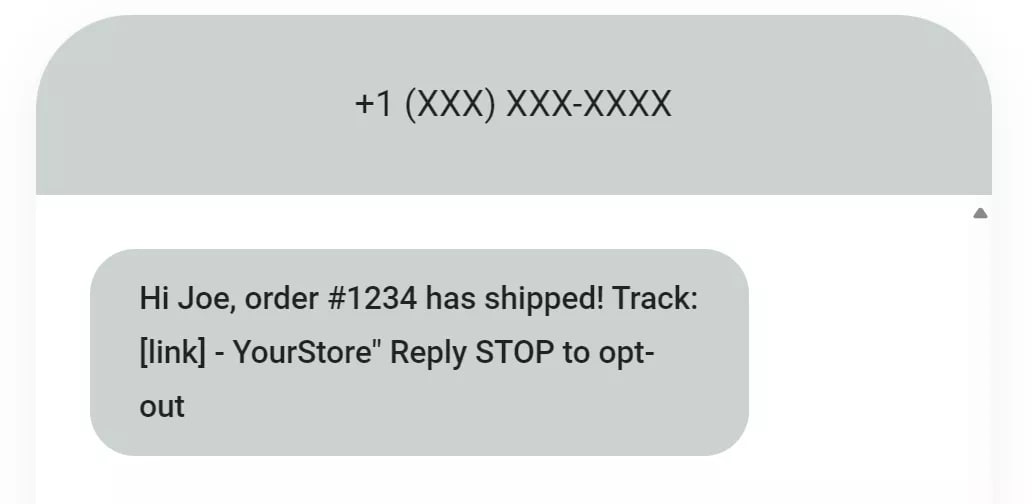
SMS charges by message length, and customers want information fast. Don’t add marketing messages to order updates — save promotions for separate campaigns.
Flash sales and limited offers
Monthly SMS promotions strike the right balance between staying visible and respecting boundaries. Send these messages during lunch breaks or between 5 and 7 PM when people are most likely to read texts.
A message like “Two-hour flash sale! 30% off sitewide. No code needed. [link] Reply STOP to opt out” creates urgency without being pushy.
The two-hour window works because SMS gets read immediately. Longer sales lose the urgency factor that makes SMS effective. Include opt-out language in every promotional text to meet legal requirements.
Abandoned cart texts
Reserve texts for high-value abandoned carts over $75. Send one text, not three. SMS feels more personal and urgent than email. Only message customers who’ve opted into SMS marketing and haven’t responded to abandoned cart emails.
Keep it personal, like “Hey [Name], you left items in your cart. Complete your order here: [link].”
The personalization here shows that this isn’t a mass messaging campaign but a carefully curated message. Set minimum cart values to ensure the potential justifies the message cost.
Other marketing channels
Email and SMS are your foundation, but other channels work well when integrated properly. Omnisend connects to your other marketing tools to create a unified customer view.
SEO tactics
Write unique product descriptions instead of using supplier copy. Customer reviews collected via post-purchase emails give you fresh, keyword-rich content that improves rankings.
Display these reviews on product pages using Omnisend’s review collection tools. More reviews lead to better conversion rates and increased search visibility.
Content marketing
Create buying guides targeting “[product] vs [competitor]” searches. Add email capture forms to these pages. Readers downloading comparison guides are ready to buy.
Import these leads to Omnisend and tag them based on which guide they downloaded, then send targeted follow-up sequences about those products.
Social media marketing
Run contests and giveaways on Instagram and Facebook, then make them visible to a larger audience with ads. Ask for emails for entry into the contests, import these to Omnisend, and nurture them with welcome sequences.
Your most engaged social media followers often become your best email subscribers, as they already know and trust your brand.
Paid advertising
Export customer emails from Omnisend to build Facebook lookalike audiences. Your existing customers’ data helps Facebook find similar buyers. This illustration shows how lookalike audiences work:
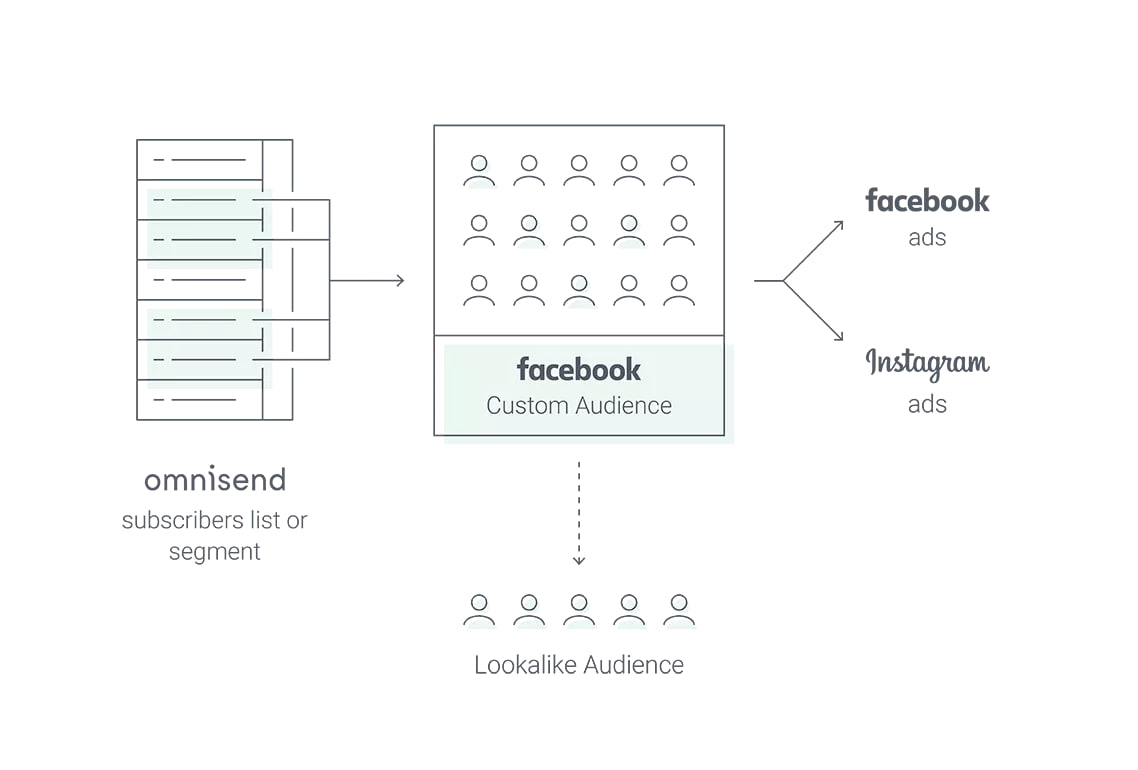
Exclude recent purchasers from campaigns to maximize ad efficiency and sync your segments, so high-value customers see different ads than one-time buyers.
Measuring dropshipping marketing success
Tracking these metrics helps you understand what’s working and what’s not:
Email metrics:
- Open rates (benchmark: 20–30% for dropshipping stores)
- Click-through rates (benchmark: average of 2–3%)
- Conversion rate from email campaigns (benchmark: 1–2%)
- Unsubscribe rate (keep between 0.2–1% per campaign)
Customer value metrics:
- Customer lifetime value (CLV) — total revenue per customer over their lifetime
- Repeat purchase rate — percentage of customers who buy again
- Average order value (AOV) trends — shows whether customers spend more over time
- Time between purchases — shorter intervals indicate stronger loyalty
- Customer acquisition cost (CAC) — total marketing spend divided by new customers acquired
Revenue metrics:
- Revenue per email sent — total campaign revenue divided by emails delivered
- Revenue per subscriber — total email revenue divided by subscriber list size
- SMS revenue vs. cost — ensure SMS campaigns generate 5–10x their cost
Profitability metrics:
- Cost per acquisition vs CLV ratio — earn at least three times what you spend to acquire customers
- Email revenue attribution — Omnisend shows exactly how much revenue each campaign generates
- Return on ad spend (ROAS) — revenue generated divided by advertising costs (target a minimum of three-to-one ratio)
Omnisend’s analytics dashboard displays these metrics in one place. You can see which automation workflows drive the most revenue, which segments convert best, and where to focus your optimization efforts. Here’s an example:
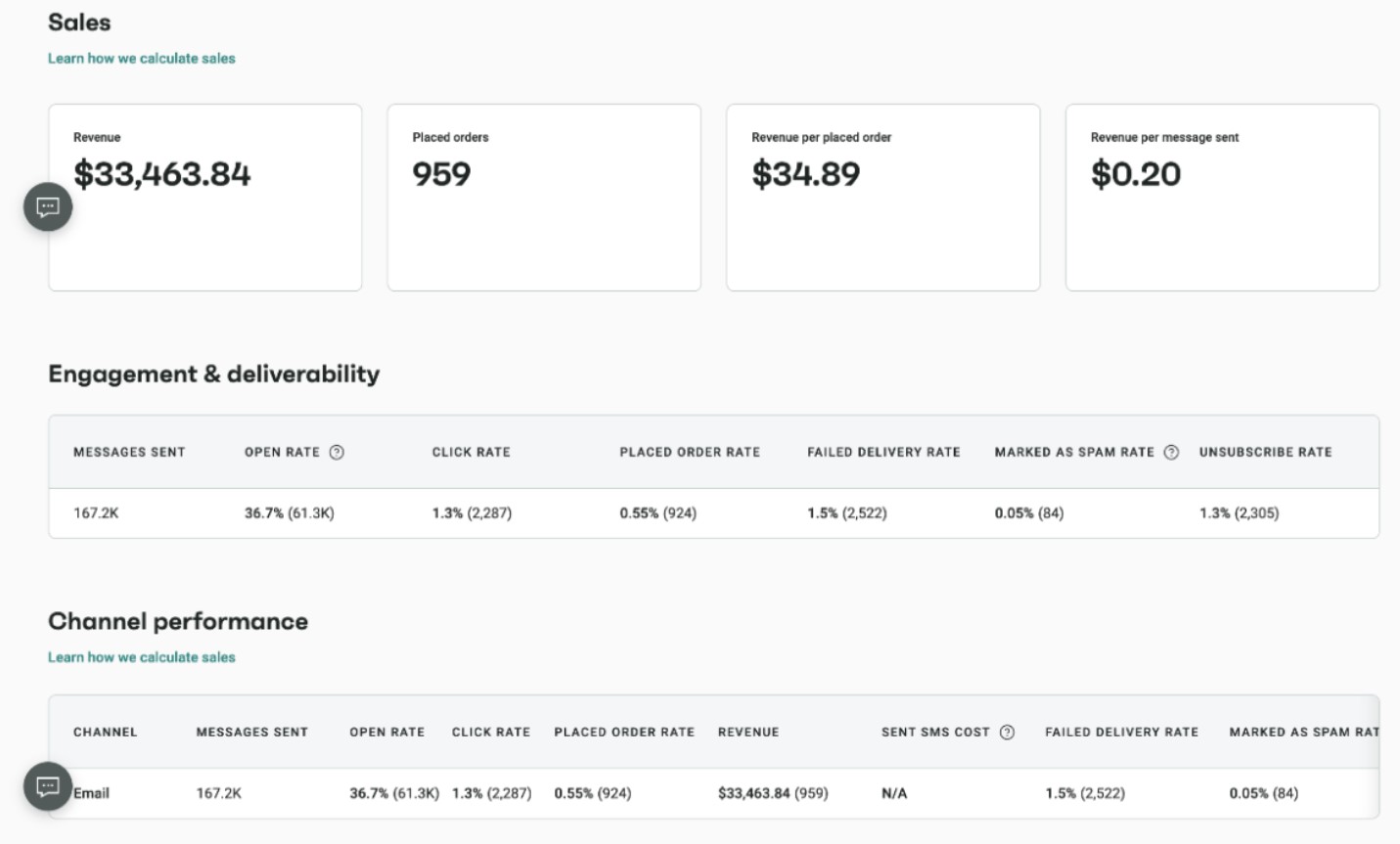
The biggest dropshipping mistakes — and how to avoid them
These mistakes can set new dropshippers back significantly:
1. Choosing unreliable suppliers without testing
Skipping the vetting process to launch faster seems efficient. Then, quality issues surface, shipments arrive late, and customers request refunds.
How to avoid it: Use the supplier evaluation checklist. Order samples before listing products. Test response times and verify warehouse locations.
2. Neglecting automated marketing from day one
Launching without cart recovery or a welcome series means losing a large chunk of potential sales. Visitors browse, add items to cart, and then leave without any system to bring them back.
How to avoid it: Set up Omnisend automation before launch, along with your WooCommerce dropshipping plugins. Create cart recovery workflows, welcome series, and post-purchase emails.
3. Competing on price alone
Engaging in a price race with identical AliExpress products creates unsustainable thin margins that don’t support growth.
How to avoid it: Focus on unique suppliers like Syncee or Spocket rather than mass-market items. Niche down to specific audiences and build a brand around product curation and customer service, rather than focusing on the lowest prices.
4. Ignoring shipping times in product descriptions
Hiding or downplaying your two to four-week delivery times can backfire — angry emails flood in, chargebacks pile up, and negative reviews accumulate.
How to avoid it: Set clear expectations in product descriptions and checkout pages. Mention delivery timeframes upfront. Choose US/EU suppliers through Spocket for fast shipping when targeting Western customers.
5. Using your supplier’s product descriptions verbatim
Copying and pasting from AliExpress can lead to duplicate content penalties and poor conversions. It also makes you look unprofessional. Machine-translated text with grammar errors doesn’t inspire confidence.
How to avoid it: Rewrite product descriptions with original copy. Use Importify’s AI optimizer if managing hundreds of products. Focus on benefits rather than just listing features.
6. Starting without understanding profit margins
Not calculating total costs can cause you to lose money on every sale. You may price products based on supplier cost alone, forgetting plugin fees, payment processing, and advertising spend.
How to avoid it: Calculate your break-even point before listing products. Add up product cost, shipping, WooCommerce dropshipping plugin fees, payment processing, and estimated ad costs. Target a minimum of 30–40% profit margin.
7. Neglecting customer service
Managing your dropshipping business passively can have negative consequences. Ignoring support requests generates negative reviews that kill future sales.
How to avoid it: Respond to customer inquiries within 24 hours. Set up automated order update emails through your WooCommerce dropshipping plugin. Be proactive about solving problems.
Launch your dropshipping store with confidence
AliDropship gives you direct access to AliExpress products and handles order fulfillment automatically — ideal when you’re testing what sells.
Spocket connects you to US/EU suppliers if your market demands quick delivery. Syncee works best when you’re juggling multiple suppliers and thousands of SKUs.
Once your WooCommerce dropship setup is running, focus on what keeps customers coming back.
Abandoned cart emails nudge people to finish their purchases. Welcome messages turn new subscribers into first-time buyers, and post-purchase sequences encourage reviews and repeat orders.
Your next steps:
- Choose a hosting provider and install WooCommerce (20 minutes)
- Select a WooCommerce dropshipping plugin based on your supplier preference
Set up an automation sequence on Omnisend (30 minutes) → Start free
Quick sign up | No credit card required
FAQs
Install WordPress on your domain under your hosting account, and then install the WooCommerce dropshipping plugin via your WordPress dashboard. Pick a dropshipping plugin for your suppliers, upload products with high margins, and turn on payments.
AliDropship provides access to millions of cheap products from China. Spocket gets you two to five-day shipping from Western suppliers. Choose based on what matters more — profit margins or happy customers.
The best dropshipping plugins for WooCommerce include:
— AliDropship ($89 one-time fee) for AliExpress products
— Spocket ($39.99/month) for US/EU suppliers
— Syncee (free plan available) for global suppliers
— WooCommerce Dropshipping ($79/year) for native platform integration
You can find vetted suppliers through WooCommerce dropshipping plugins like Spocket (US/EU suppliers) and Syncee (US, Europe, Canada, Australia). You could also manually connect with local suppliers through WooCommerce or use dedicated dropshipping plugins for AliExpress and Amazon.
Yes, most WooCommerce dropshipping plugins offer automation for order fulfillment, inventory updates, price synchronization, and order tracking. You can also automate marketing with plugins like Omnisend for email campaigns and abandoned cart recovery.
WooCommerce offers complete store ownership, extensive customization options through WordPress themes, no inventory management, and access to various suppliers through WooCommerce dropshipping plugins. The platform is free but has third-party hosting costs.
WooCommerce costs less long-term and offers more customization via WordPress. Shopify provides an easier setup with built-in hosting. Choose WooCommerce for control and lower costs or Shopify for simplicity and managed infrastructure.
Initial costs include hosting ($20+/month), domain ($15+/year), and dropshipping plugins (free to $89 one-time or $29+/month).
Business license requirements vary by location. Most jurisdictions require business registration if you’re operating commercially. Check your local regulations for specific requirements regarding sales tax collection and business permits.
Your profitability can vary based on niche selection, marketing effectiveness, and automation setup. Most successful dropshippers see their first profits within three to six months after optimizing product selection, supplier relationships, and marketing automation.
The best niches have engaged audiences and solid profit margins. Popular options include:
— Fitness equipment
— Pet accessories
— Home organization
— Sustainable products
— Hobby-specific gear
Avoid oversaturated niches like generic phone cases unless you can differentiate significantly.
TABLE OF CONTENTS
TABLE OF CONTENTS


No fluff, no spam, no corporate filler. Just a friendly letter, twice a month.

 OFFER
OFFER







